News
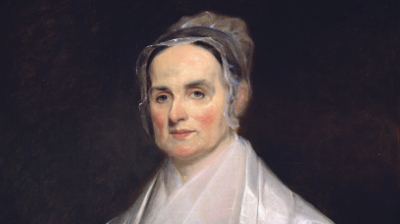
“American Quaker Women Who Changed Our World”
You are invited to a
Talk in celebration of the 400th anniversary of Quakers
The Library Nelson November 23rd at 1 pm.
Tensions at the heart of the recent American election are long standing and go back to the early years of the American Republic. In 1783 when the War of American Independence ended and the new nation of the United States was established the central question facing the new nation was,(and still is), what would the new state stand for? Was it founded on violence of race based chattel slavery, the sexual exploitation of women and the sale of their children. Or on free labour, equal opportunity and inclusion?
The Declaration of Independence of 1776 declared the ‘self-evident ‘ truth ‘that all men are created equal,…and…. endowed by their Creator with certain inalienable Rights’. Quakers were the first and most consistent religious group to insist that ‘all men’ meant ‘all’ - women and men, black, white and indigenous people and that lasting peace required recognition of this simple fact.
Quakers, especially Quaker women, were at the very centre of the intense public debate about the nature of the democracy that emerged between 1783 when the American War of Independence ended and 1861 when the Civil War began. Abolitionist Quaker women worked tirelessly against war and violence. They challenged the violence and sexual exploitation endemic to slavery. They promoted temperance, non-violent resistance and the equal franchise and education for black and white, women and men.
Phillida traces four women whose remarkable lives are central to the debate about the nature of the new country. They established free schools, clinics and hospitals for the poor and opened the first medical schools for women.
The concerns about racism, violence and the suppression of women raised by Quaker women 200 hundred years ago echo through this most recent election. Will the opportunities they pioneered survive?
Are peaceful solutions still possible?
All welcome.
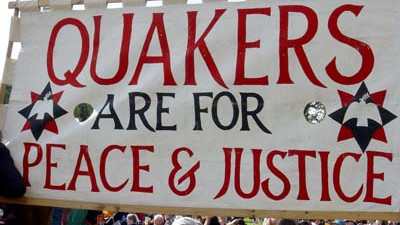
Quakers around Aotearoa are celebrating the 400th year of Quakerism. In Whakatu Nelson, Friends are planning a Library display in November of Quaker books, leaflets and posters. Phillida Bunkle will speak about Quaker women’s role in the abolition of slavery in the US. Lizi McLeod-Taepa will introduce the history of Quakers in Whakatu Nelson using embroideries completed by Nelson Friends.
In other centres, there are library displays, open invitations to Quaker Meeting Houses, speakers introducing the work of Quakers today and in history. Auckland Central City Library has a display of original Quaker texts held in their archives – you’ll find their display on the second floor. Wellington Friends are arranging a display of Quaker origins, current and historical activity and organisations. Their children are baking birthday cakes to offer visitors. They will be telling children’s stories of the original Quakers, our values, and the commitments of Quakers today in Aotearoa and around the world.
2024 marks the 400th anniversary of the birth of Quaker co-founder George Fox and we are in the 400th year of Quakerism worldwide. 1652 is generally recognised as the date of the founding of Quakers (the Religious Society of Friends).
As a sincere and spirited Christian, Fox challenged the unjust order of things, and led a life that continues to inspire us today. We can also give thanks that centuries on from the beginnings of Quakerism, the movement continues to grow, evolve and make change.
It’s worth saying early on that Quakerism has never been about one man. It was born of the coming together of many people who were questioning conventional Christianity, as they gathered and journeyed on their spiritual paths together. Many Friends enjoy reading the works of George Fox, but Quakers are not ‘Foxists’. Fox did not claim to be a theologian or theoretician in the traditional sense, but rather he, Margaret Fell, Elizabeth Hooton, James Naylor and many others, were preachers and organisers who encouraged all to share the experience of the divine as revealed to them.
As a young man, George Fox longed for a genuine faith, in contrast to the legalistic and institutional church he grew up in. He looked in vain for human help and studied the Bible so thoroughly that he learned much of it by memory. After years of searching, he found inner peace by experiencing the inward Light which he recognised as his guide. For Fox and many Quakers today, the Light was of Christ; others might say the Light of God, or of Goodness, or of conscience.
As Fox shared what he had found, others responded and joined, and a Spirit-led movement of Christian renewal was born. They called themselves the Children of the Light, and later the Religious Society of Friends. A rapid period of growth began which saw more than 60,000 people join the movement over a 12-year period. This growth did not come without pain, and yet these early Friends remained faithful to their beliefs, even in the face of severe persecution. Many of them were put in prison, some forfeited their property, and others were beaten, or even killed. They were given the nickname “Quakers,” originally a term of derision, but eventually embraced as a badge of honour.
Between 1654 and 1660, Friends had left a personal witness in more than 20 countries. This pre-dated the modern missionary movement by more than a century. The Quaker movement has survived and thrived as it has spread to more than 100 countries of the world. The largest concentration of Friends in the world today can be found in east and central Africa.
It’s the way of Quakers as spiritual people in community to exist in dialogue with one-another and our forebears. Accordingly, there is no compulsion to agree with every word of any early Friend; we continue to engage with the traditions we have inherited, in order to carry the Quaker way forward in the 21st century, as we each seek the help of God and one another to continue in the spirit of our testimonies to simplicity, peace, integrity, community, equality and sustainability.
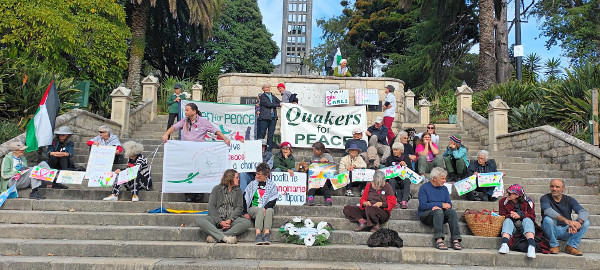
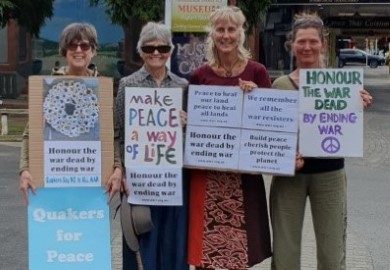
Each year on Anzac Day Quakers and others gather on the Church Steps in Nelson in vigil for peace. (A vigil is a stationary, peaceful demonstration in support of a cause, typically without speeches). Our vigils bear witness to the horrors of war for combatants and non-combatants alike, as well as the desecration of homes, schools, hospitals, infrastructure, land, the environment, and the climate.
Sadly, there have been 81 interstate wars since WWII, such as Korea, Vietnam, Kuwait, Iraq, Afghanistan, Kosovo, Syria, Libya, The Ukraine, Gaza . . . . And then, many civil wars.
Quakers have been rallying alongside others every Saturday in Nelson in support of the Palestinian people, and at this year’s vigil in Nelson we were joined by Palestinians and supporters. There can be no peace without justice – the daily reports from Gaza testify to the unspeakable injustice of life for the people in Gaza; moreover, war cannot achieve lasting peace. Unless and until those funding and arming Israel, those profiting from war, those waging war, cease and begin genuinely to listen, negotiate, and work towards settlement, this conflict will simply generate the traumatised warriors of tomorrow.
In Motueka, for the second year, we few gathered to display our call for peace, to honour the war dead by ending war. We were heartened by the acknowledgement of those in the endless stream of cars, with even a toot or two.
We hope you will join us at the rallies for the people of Gaza (FB: Te Tau Ihu Palestine Solidarity) and next year at our peace vigils on Anzac Day.
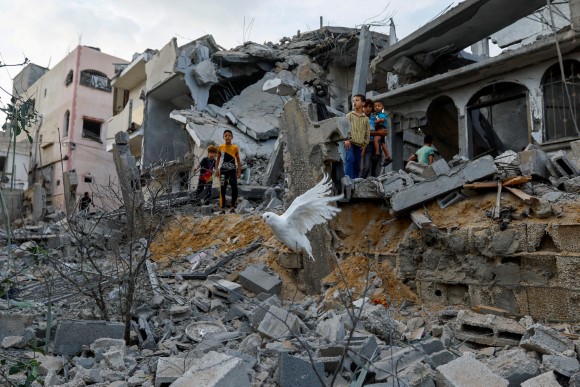
Recently, at one of the 15 weekly rallies (so far) in support of the Palestinian people in Gaza and the West Bank at which Quakers in Nelson have witnessed to the horror of genocide, our Friend Elizabeth Dooley made the following address, drawing on the response of Quakers internationally:
It is time for everyone - including the international community - to recognise that no military solution will bring a permanent end to violence. Only a peace based on international law can do that.
We urge all governments and international leaders to ensure humanitarian access and response. We call for a ceasefire and release of hostages to prevent further loss of life and suffering for Israelis and Palestinians.
Behind the rising numbers of deaths and casualties are individual lives ended or changed irrevocably. We mourn those lives already lost and call for an immediate ceasefire. Indiscriminate attacks on civilians are always unjustifiable. They violate international humanitarian law which seeks to limit the harms of war and protect non-combatants.
We condemn the Hamas attacks on Israeli civilians and the taking of hostages.
We also condemn the violent actions of the Israeli state in Gaza, including air strikes into areas of high civilian populations, and cutting off water, electricity, and access to humanitarian relief. We have said before that these cycles of violence must be understood in the context of Israel's military occupation of Palestine, including the blockade of Gaza.
The past year has seen record levels of attacks on Palestinian communities, and a sharp increase in human rights violations. This includes demolition of homes and schools, repression of non-violent protests and mass arrests.
As Quakers we place equal value on every human life and see that the structural violence of the occupation damages all people of the region. We believe the situation can only be resolved when the occupation has ended and the inherent equality, dignity and worth of all is recognised."
The Quaker School in Ramallah continues to operate, working remotely when necessary. They issued a statement in December 2023:
Friends United Meeting [the contact Quaker group in the US] and Ramallah Friends School stand in solidarity with the people in Gaza and all Palestinians who continue to endure ongoing suffering under occupation. We condemn all acts of violence and are horrified by the escalation of the bombing of residential buildings, UNRWA schools, and public institutions, and the recent shelling of the Al-Ahli Hospital. We grieve the loss of innocent lives . . . Our hearts are with the affected families and the people, and we mourn deeply for the lives lost in this conflict.
In another communication the Head of School wrote:
The shelling of the Al Ahli Episcopal Hospital left us profoundly shocked and in mourning, a sentiment shared by the entire country. Consequently, the government is mourning, and we suspended in-person and online classes for two days. Every night, we are tasked with convening with fellow school leaders to determine our course of action for the next day.
It is incredibly challenging for adults and children to fully grasp the magnitude of what has transpired and the shock of the high number of lives lost. The children in Gaza are living in constant fear and desperately require protection. While we recognize this pressing need to protect the children in Gaza, we are equally conscious of the profound shock experienced by our own students in the wake of recent events. Therefore, we are responsible for providing them with a platform to express their fears and emotions while nurturing an environment defined by care, empathy, and unwavering support.
As we navigate these turbulent times together, our mission remains resolute: to serve as a beacon of strength and compassion in a world where uncertainty prevails. I want to share the profound insight shared by one of our senior students who highlighted the stark reality that the number of children who have tragically lost their lives is equivalent to, if not more than, the number of children within our school campuses. Pondering the possibility of our students facing such a fate underscores the complexity of life and the necessity for enduring compassion so that our humanity does not fail us.
In December 2023 the children of Ramallah School uploaded a song of hope to You Tube:From Ramallah Friends School to the world, we share our version of the timeless “ Little Drummer Boy.” Our hearts come together in prayer for the safety of the children in Gaza. May our shared prayers echo for peace and justice, weaving a tapestry of hope that goes beyond borders, embracing the shared humanity we all hold dear. Please follow this link to watch the song: https://youtu.be/ZsEbIVJy0Gg?si=jj3WoKsFJt2OTGFO
Actions you can take
This information was adapted from Quakers in Britain website, www.quakers.org.uk.
Tell your elected representatives to act now
On 13 October, the Israeli military called for 1.2 million civilians in northern Gaza to relocate to the south within 24 hours. The UN said that this would be impossible without devastating humanitarian consequences, as we have seen. According to the Norwegian Refugee Council, "absent of any guarantees of safety or return, [this amounted] to the war crime of forcible transfer". The international community must act to uphold international law. Contact your MP
Donate to Medical Aid for Palestinians
The bombardment has led to a desperate health and humanitarian crisis in Gaza. Medical Aid for Palestinians are responding to the current emergency where hospitals can't cope with an influx of serious injuries - indeed most hospitals are now not able to function at all. Donate now.
Understand the context
This major escalation did not happen in a vacuum. Here are some resources to help you understand the context and the events that led to this point.
The history of Israel and Palestine
This 6-minute video from Jewish Voice for Peace offers a simple and succinct historical background. Watch on YouTube.
Life in Gaza
Gaza has been under Israeli military blockade since 2007 and is often described as 'the worlds largest open air prison'. 80% of its population rely on foreign aid to survive and 97% of the water is undrinkable. This virtual tour by Israeli-Palestinian tour group, Green Olive Collective, takes you around Gaza and introduces the political and humanitarian realities. Watch on YouTube.
2023 in the West Bank
In the final days of 2022, the most religious and hardline right-wing government in Israel's history was sworn in. Since then, there has been a rapid increase in violence towards Palestinians in the West Bank, including the highest daily average of settler-related incidents affecting Palestinians since the UN started recording this data in 2006. By September, almost 2,000 Palestinians had been displaced due to settler violence and military demolitions of essential structures, including homes and water resources. Meanwhile, the new Israeli government committed to building thousands of new illegal settlements on Palestinian land. The military also carried out mass raids and arrests, including of children, and doubled down on the use of 'administrative detention', holding almost 1,200 Palestinians indefinitely without charge or trial. You can read eyewitness testimonies from our human rights monitors in the West Bank for a thorough understanding of the issues. Visit the Eyewitness blog website.
Choose your media wisely
News
Actively seek out articles written by Palestinians and Israelis. We recommend subscribing to the joint Israeli-Palestinian online news outlet 972+ Magazine, or for televised / international coverage, Al Jazeera English, which has journalists in both Palestine and Israel.
Social media
Human Rights Watch and others have reported on the circulation of a number of unverifiable posts trending on social media. Please be mindful of what you share. Due to Israel's cutting off of electricity and the prohibition of international journalists into Gaza, it is becoming ever more challenging for Gazans to get their story heard. Palestinian and Israeli human rights organisations are doing their best to keep up the reporting under unthinkable conditions. Here are some suggested accounts to follow that are especially active right now:
- Al Haq (Palestinian) - FB / X
- Al Mezan Centre (Palestinian) - IG / X
- B'Tselem (Israeli) - FB / IG / X
- Breaking the Silence (Israeli) - FB / IG / X
- Center for Jewish nonviolence (Israeli) - FB / X
- Defence for Children International (Palestinian) - X / IG
- Gisha (Palestinian) - FB / X
- MAKAN (Palestinian) - FB / IG / X
- Palestinian Center for Human Rights - FB / IG / X
- Rabbis for Human Rights (Israeli) - FB / IG / X
- We are not numbers (Palestinian) - FB / IG / XYesh Din (Israeli) - FB / X
There is also a list of Palestinian and Israeli human rights organisations on the www.quakers.org.uk website at Eyewitness blogs website.
Other media
The Oscar-nominated Palestinian short film The Present on Netflix illustrates the everyday humiliations Palestinians face living under occupation.
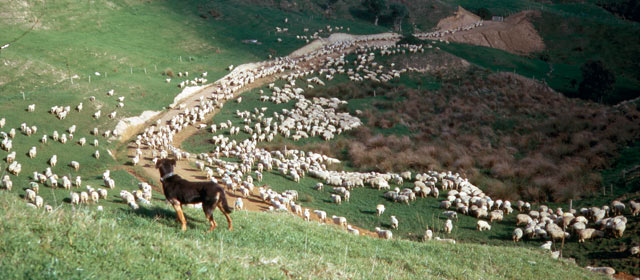
Here is Shona's prize winning short story:
My Father’s House
You were nine years old, and it was Friday afternoon. When the final bell for the day rang, you were let out of school with all the other kids, everyone running for their bags, jostling and giggling and stuffing any bits of homework in with lunchboxes and jackets. Usually, you and your little sister got the bus home with all the other country kids. But on certain Fridays, which particular ones known only to your mother, she would be waiting to pick you up in the car, and you knew the trip home with her would be a happy adventure of exploring the parcels piled up on and under the back seat as best you could while the car creaked and lurched over the hills and around the winding gravel roads to the farm. There was always a festive air about those Fridays, the exciting aromas of different foods and the anticipation of treats, and your mother’s happy frame of mind after her day away from the farm and all that it entailed all combined to make it an exciting and happy occasion.
On that Friday there she was, waving to you and your sister. Seeing her waiting there was even more exciting than usual for you because your next birthday was only ten sleeps away and you were sure that amongst the array of parcels and food she always came home with on these Fridays there would be something special for you. So, you nestled yourself amongst the pile of groceries and some oddly shaped parcels on the back seat beside you and as the car wove its way home you did your best to quietly explore.
You were so excited you thought you might burst. The car swung off the road and up past the mailbox to the gate. You were quick to jump out ahead of your little sister so you could be the one to open it. Then you shut the gate behind the car, being very careful to put the latch where it should be, and as your father had taught you. Then you ran up alongside the car to the house.
Home. You and your sister helped take the parcels out of the car. You examined each one while keeping an eye on your mother’s comings and goings to the house and back. Had she bought birthday presents for you? What was in that big funny shaped package? You wouldn’t dare open it; you might be sent to your room if you did such a thing. And your mother kept an eye on you as she swept past with another armload.
Later you went looking for your dad, but he wasn’t up from the paddocks yet. So you found a book and settled down in a corner of the lounge and began to read. It was nice and quiet in there and you were happy to be by yourself for a while. You don’t know how long it was until you heard the thump of his gumboots on the porch. A few minutes later you heard him coming into the lounge and across to his chair. You knew he was there, but you kept on reading. You still wonder why you didn’t say hello that day. Everything was quiet for a bit. Then there was a noise, and you lifted your head and looked at him and he was lying back in his chair with his feet and arms stretched out. His eyes were shut and he was making awful noises. One of your big sisters came running in and shouted for your mother. When she came in, she told you to run and get Janet, our oldest sister. She was still down in the paddocks. She was training to be a nurse and she just happened to be home for a few days leave. You ran to the back gate and you shouted as loud as you could until she appeared. Then you ran back into the house behind her and you heard your mother ringing for an ambulance. That was a new word for you. Ambulance. After that, things got very muddly and blurry and you didn’t see your father again.
You didn’t go back into the lounge. You played with your little sister for a bit outside then Janet came out and took both of you into your mother’s room. She said you could both hop into the double bed with your books. You could have dinner in bed tonight. You had never heard of such a thing. No children ever got into the double bed, let alone with food. You began to understand that something strange had happened.
You didn’t know what, but there was this fist of fear, a cold lump in your stomach growing larger by the minute as you did what you were told. You read and played games with your little sister then as the sky began to darken outside you saw cars arriving and people standing around on the lawn beyond the bedroom window. You recognized most of them even if you didn’t know their names. They were people who lived on farms around yours, and they were all friends of your dads. They all looked very sad. Your mother came into the bedroom with food for you and Margie. She sat on the bed for a bit while we ate. We were hungry. We had never had sandwiches for dinner before.
‘I’ve got something to tell you.’ She said. ‘Your daddy died today. He had another heart attack and it killed him.’ Margie started crying and you just froze. You hadn’t said hello to him after school. You felt worse than you had ever felt in your whole small life.
Later when most of the people on the lawn had gone your mother said you and Margie were going to stay with Ian and his family for a few days. You felt better for a while because playing with Ian was fun, he was your friend. and he had a treehouse and being up in it surrounded by birds and branches and sky was the closest you had ever come to magic.
You were packed up in pyjamas and dressing gowns and taken by Ian’s mother further down the country roads to Ian’s house and you were given milo and cake then put to bed. For a time, your days were full of running all over the farm with Ian, playing in the treehouse every day, chasing rabbits, and playing with pop guns. Sometimes his big brother Jimmy was there helping his father with things on the farm., and sometimes Ian’s little brother came with us when you went exploring on the hills above the house . One night you woke in the dark screaming. An avalanche of grief, the understanding that your father was dead and you would never see him again. You couldn’t stop crying. Ian’s mother came in and she did something you would thank her for forever. She didn’t try and stop your tears; she just quietly bundled you up in a warm blanket over your pyjamas and drove you back to your home on those dark and winding gravel roads.
You still remember walking back into the house that night and the overwhelming relief of being home. This place was the closest you could be to your dad. This is where he sat at the table, this is his chair by the fire where he read you books and talked to you. This is the window where you both watched the thunder and lightning storms when they came, and this is the back porch where he put on and took off his big black gumboots every day. This is the times table he wrote out and pinned above your bed when you were struggling to learn them. This is the cardboard boat he made you to sail in the puddles and that is the baby rabbit he sent you out to find in his boot on the back porch one day. This is how you learnt to ride a horse, that is where he hung his jacket, and this is where you knew proper love. You understood he had gone but in some incomprehensible way he never would leave. He was here, in every inch of this place and in every inch of your heart.
And he’s been with you in all of the journeys and adventures and catastrophes which have made up your life since then. His photo is still beside your bed, wherever that happens to be. You are now seventy-three and you still talk silently to him from time to time. And you realize now that one of the best things about growing older is you have learnt to be grateful for the point at which the pain of missing him began to change into a gratitude for having ever had a man like him in your life at all.
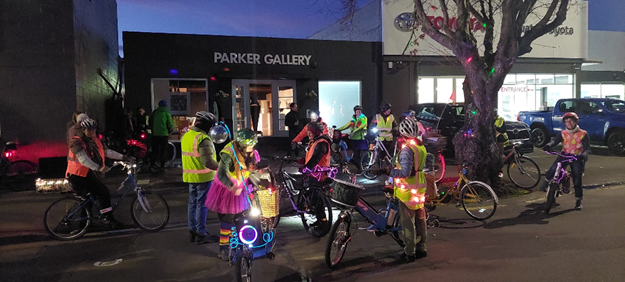
On Friday 4 July, a group of friends including our Quaker Friend Elizabeth Dooley took their first Joy Ride. Elizabeth reports: “We lit up our bikes and ourselves and followed the route of Te Ramaroa (Nelson's Light Festival). We have set up a Facebook Group “Joy Riders" (https://www.facebook.com/groups/joyriders.nz/) and we'll ride every 4th Friday from now on . The next Joy Ride is Friday 28th. Why not join us."
Here's what the FB public group page says: Welcome to the 'Joy Riders' group - The idea of this came during a meeting of people from various other groups where we were brainstorming ideas to encourage more people to cycle.
We realised that we missed the social rides that we'd had in the past and at the same time, what better way to encourage people to cycle than to show how much fun can be had on a bike.
The last Friday of the month was suggested for a new monthly evening social ride, and that was just two days away from the meeting and also the first night of Te Ramaroa.
So for the inaugural ride we lit up our bikes (and ourselves) and followed the map of the art installations - it was a lot of fun!
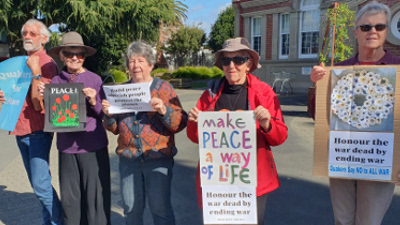
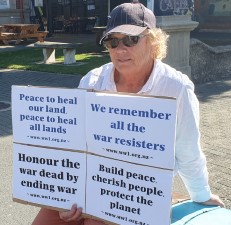
On April 25th 2023 Quakers gathered outside the Museum in Motueka for a Peace Vigil. Our posters called for NZers to cherish people, protect the planet, remember conscientious objectors, and make peace a way of life.
Quakers have a commitment to peace. During a civil war in the 1650s the first Quakers in England declared their opposition to war and preparations for war. Every year on Anzac Day Quakers commemorate the loss of all life in war, combatants and non-combatants
Grotesque images from Ukraine underscore that war today is the failure of yesterday that leads to unimaginable human suffering on all sides. Imagine what could happen if we were willing to invest as much in peace as we currently do in preparing for war.
Information from Peace Movement Aotearoa on militarism shows accelerating global military spending. Here is their report Militarism will cost us the earth:
The five largest military spenders in 2022 were the US (39% of the global total), China (13%), Russia (3.9%), India (3.6%) and Saudi Arabia (3.3%), which together accounted for 63% of world military spending. Military expenditure decreased in Africa (-5.3%) last year, but increased in four of the five geographical regions, with the highest increase in Europe (+13%), followed by the Middle East (+3.2%), then Asia and Oceania (+2.7%) and the Americas (+0.3). Overall in 2022, the military burden (military spending as a share of gross domestic product) globally was 2.2%.
In last years Wellbeing Budget, military spending was a total $6,077,484,000 - an average of more than $116.8 million every week, and a 10.4% increase on actual spending in 2021. The spectre of an additional $20 billion (NZ) to be spent over the next decade on increased combat capability, warships and military aircraft continues to threaten the possibility of substantive action on human health and wellbeing, and climate justice.
The ongoing prioritising of military spending - whether here in Aotearoa or around the world - is a reflection of the destructive deadly ideology of militarism, which focuses on outdated narrow military security concepts that continue to harm the future of humanity and the planet, rather than real human security that meets the needs of all.
It is truly shameful that military spending continues to rise in the midst of ongoing social inequities, the rapidly worsening climate catastrophe and humanitarian crises: a transition from combat-ready armed forces to civilian agencies to meet the needs of all peoples and the planet is long overdue.
The IPCC has warned that if we want to have a liveable future, taking the right action now is needed for the transformational change essential for a sustainable, equitable world [6] - clearly it is time to invest in the future for peoples and planet, and budget for peace, not war. Unless there is an immediate and meaningful change in states’ priorities, militarism will cost us the earth.
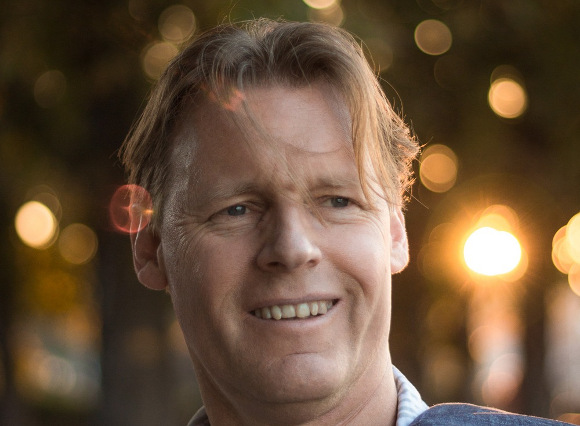
Alyn, an accomplished lifelong Kiwi peace activist, nominated for the Nobel Peace Prize in 2015, has won numerous awards for his work, including the Loxley Award established by a bequest of Ken Loxley of Nelson Quaker Meeting. Alyn visited NZ recently and spoke to a public meeting in Nelson. Now Director of the Basel Peace Institute in Prague he spoke hopefully, with compassion and balance, reminding us that in every situation there are good people who want the best outcomes. Despite being close to the war in Ukraine, which has had a noticeable impact on Europe, Alyn is hopeful that the United Nations has strong enough processes and there are enough people with good will to eventually bring peace and prevent other conflicts.
He divided his talk into three parts: Climate, Peace and Nuclear war, and spoke about the potential that exists within the UN to tackle each of these.
He gave as a recent example of using the UN to tackle climate change students in the Pacific who have taken a case to the International Court of Justice, challenging the world to take stronger action on climate change. Encouraged by the 1996 example of New Zealand taking a case against nuclear weapons to this same court and obtaining a ruling against them, the students are using the same process. Although that 1996 decision did not eliminate nuclear weapons, it asserted that it was against basic human rights, especially the right to life, to use them. This laid a foundation for nations to make decisions. The Pacific students hope the same will be true for climate change, because failing to act threatens the right to life, especially in small island nations which could be inundated by sea level rise.
Regarding peace, Alyn gave examples which emphasised the need to deal with conflicts before they build up to war. In the case of Ukraine, the accusation of genocide which Putin used to justify his invasion could have been addressed through international courts. It is too late to do that now and action from the Security Council is blocked by Russia's use of the veto, but there are other options. A special session of the UN General Assembly, 'Uniting for Peace', has affirmed that the invasion was an act of aggression. Liechtenstein has taken the initiative to require the major powers to justify their veto and to strengthen the General Assembly. The Human Rights Council, where the UN adopted the human right to peace, is another venue for addressing the invasion.
Meanwhile, the International Criminal Court (ICC) is investigating war crimes, crimes against humanity and genocide. The court can investigate widely and issue arrest warrants, which may not stop Russia at this point but might give other nations reason to pause for thought before attacking. In the case of Ukraine, war crimes include attacking civilian targets such as apartment blocks and crimes against humanity include the deportation of children, a matter Russia does not deny - Putin himself has reported widely that children have been taken to 're-education camps'.
Using the ICC has a precedent from the 1990s when Serbia allowed its leaders to be tried. While Putin may not be extradited, if he travels to any of the 123 countries which endorse the court's decision he will be arrested.
All of this is very real to Alyn when he is in Prague. He hopes the international community will use their many options: economic, legal, and the ability to negotiate if the aggression stops.
Regarding nuclear weapons, Alyn noted that Putin is making threats coercively when he states that he has nuclear weapons but so far that has not caused the European states to retaliate in kind. Even Biden in the US has maintained moderate language, resisting the pressure to say 'we have nuclear weapons too' and only asserting that the use of nuclear weapons would be 'crossing a line'. The G20 countries, six of which have nuclear weapons, agree that it is important to uphold the rule of law and any threat or use of nuclear weapons is inadmissable. Even Putin's advisors have been seen to hold him back from making outright threats, knowing that the weapons have been outlawed. Keeping to moderate language has deprived Putin of an excuse to escalate the conflict.
But other situations: India and Pakistan, China and Taiwan, have seen nuclear weapons used as a threat in emotional statements. It is important to be able to bring in mediators to de-escalate conflicts and remind the actors that what they are doing is illegal. This does matter, even to aggressors.
Alyn pointed out that when Europe adopted NATO with its emphasis on military solutions and its requirement for members to increase their armaments, there was also another option: Organisation for Security and Co-operation in Europe. OSCE has a different focus and operates with 57 member states who use political dialogue and shared values to make progress together and offers alternatives to military solutions.
While there are many more options in the UN than most of us realise, the way in which the veto blocks the Security Council is often regarded as a hopeless situation. It is written into the Charter and could not be changed lightly. Alyn reminded us of its history and that the major powers of the day would not have joined the UN without that privilege. Meanwhile, other means can unite nations and make progress: building the power of the General Assembly, bringing more countries in to the Security Council or creating more security councils with different briefs, such as for the environment or a Trusteeship Council which would oversee global commons such as the earth, the high sea and space. All of these could be developed using the current UN charter. And in 2024 in the Summit of the Future the UN Charter could be reviewed.

This (edited) statement is not a statement agreed by the national organisation of Quakers in Aotearoa, it is a statement which has been approved by Nelson Recognised Meeting.
In December 2022 Nelson Meeting recorded the following Minute:
Nelson Recognised Meeting records our concern, because the numbers of detransitioners are increasing internationally, for the wellbeing of children and young people who may at school and through friendships and social media come to believe that they have an identity different from their sex. Our concern is that through social pressure and internet misinformation and in the absence of long term, evidence-based research, some children who are affirmed as their chosen gender and some of whom may have autism, ADHD, trauma, OCD or other mental health problems, are much more likely to undergo irreversible medical and surgical treatments, that they may later regret.
We record our respect for those whose early and enduring gender dysphoria leads them in their mature adulthood to choose to transition to the opposite sex.
We record our concern that any discussion on important but controversial matters should be conducted in the Quaker tradition of respectful listening.
Nelson Recognised Meeting's Minute records the view of our Meeting, it is not an agreed Minute from Yearly Meeting Aotearoa, and does not necessarily reflect the view of all New Zealand Quakers.
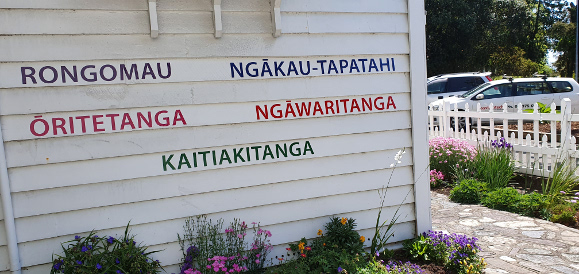
Last year in face of the Covid pandemic and government regulations Quakers in Nelson decided that we wanted to be able to meet the needs of our members and the needs of our community by having two Meetings for Worship on Sunday, one at 9 am for those with vaccination passes, and one at 10.30 for those without.
Now that all restrictions have been lifted we reconsidered whether we would continue with two Meetings. The outcome is that we will continue to have two meetings, both open to all. Mask wearing is optional at both Meetings, whatever makes you feel more comfortable. The timing has changed though - there will be an Early Bird Meeting at 8.45am and a Mid-Morning Meeting at 10am. Everyone is welcome to attend either or both of these Meetings for Worship.
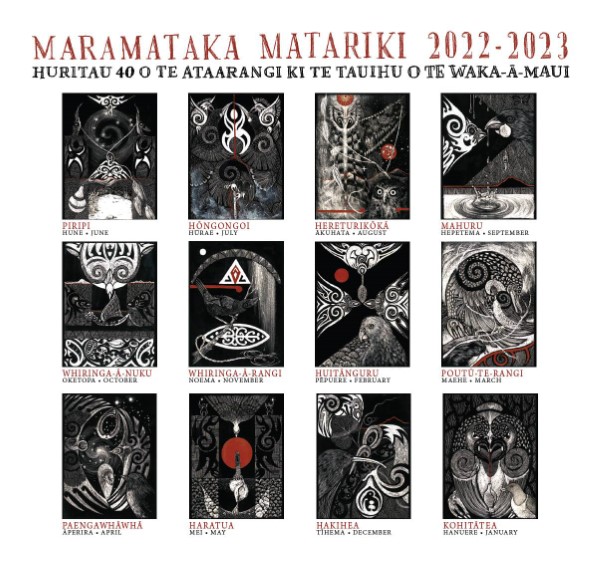
Last year the Nelson Quaker Meeting hosted a visit by Quentin Abraham from Wellington Quaker Meeting. Quentin has a ministry creating awareness of colonisation's negative impacts on Maori wellbeing in every sphere, but especially in the near loss of the Maori language. Quakers have a commitment to Te Tiriti o Waitangi, and Quentin's challenge to us was to honour that by learning to speak te Reo Maori. Several members in the Meeting have studied Te Reo without being able to speak it. One grew up with her father fluent in Te Reo but she didn't learn it from him. Our response to Quentin's challenge was to decide to form a group and seek a Te Ataarangi teacher recommended to us, Maria Oxnam, who might be able to work with us. Initially there were 11 of us keen to get started.
The local Te Ataarangi organisation invited us to apply formally, and in the end 6 of us did so. The others were for one reason or another unable to continue. We were assigned a different teacher but they weren't able to take up the role and we were assigned Maria. We are blessed to be learning with such a gentle, patient, knowledgeable and personable teacher.
We 6 Quakers share our lessons with 6 other interesting learners, all of us pretty much beginners despite exposure some have had to academic study of Te Reo. We are asked not to rely on written notes, but to learn through the oral tradition. In session we do not use English, and Maria uses sign laungauge to communicate new words and to encourage repetition as we learn the sounds from her and each other. We are asked not to correct each other or prompt each other but to focus on our own learning. We guess the meaning of new words from context, but after sessions can make notes and check out meaning.
On its website Te Ataarangi is clear on its learning principles, which are based around humility and respect. “Te Ataarangi is a total-immersion approach to learning the language. It has a focus on creating a safe enviroment for learners to develop their skills in communicating in everyday language.” "Since its beginnings in 1979, Te Ataarangi has engaged Māori communities in learning Māori in homes and on Marae. People from all walks of life are drawn towards this learner friendly method of learning language. Provided with a supportive learning environment you move at your own pace. Like a whāriki (woven mat), the language is interwoven with tikanga Māori and opens the door to the Māori world."
3 times a year we will come together on a Saturday for extended lessons alongside other students who have been learning for years. Our first, a couple of weeks ago, introduced us to Matariki, the names of the stars and their roles in Te Ao Maori. This briefest of introductions made Matariki meaningful in a way it would not otherwise have been. We recommend this way of learning Te Reo and about Te Ao Maori to everyone.
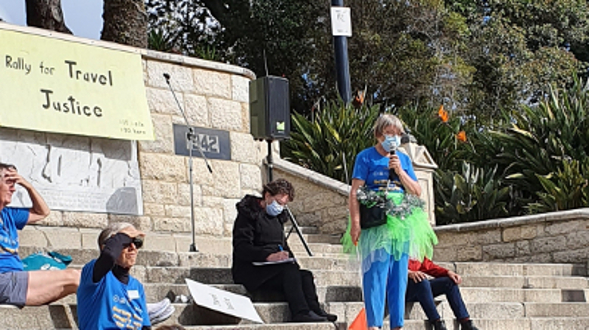
In her bright green tutu Elizabeth and friends from Nelsust (Nelson Sustainable Transport group) drew a large crowd of cyclists and walkers to the Church Steps at the beginning of May to call for an end to the domination of cars in urban areas and greater safety for other road users. The rally aimed to raise awareness of the daily risks of injury to pedestrians and cyclists having to share the streets with ' 2 tonne, large metal boxes'. Peter Olorenshaw of Nelsust spoke briefly about how the speed of vehicles affected survival outcomes in crashes. He showed a graph of impacts according to the speed of the vehicle - if you are hit at 30kph, there's a 10% chance of death in a car crash. At 50kph, it goes up to an 80% chance. He and others called for a reduction in speed limit within the CBD to 30kph, unless there is a dedicated bike lane separated from traffic.
Two speakers from Free Fares New Zealand advocated for community card holders, students and young people to share the advantage enjoyed by Gold Card holders of free public transport. They argued that the uptake by older people of public transport reduces carbon ommissions. Extending the scheme would be good for the planet, and good for those on low incomes.
Elizabeth said she joined Nelsust about a year ago due to her personal frustration at the dangers cyclists faced – both in her own experience and from what she had heard from others. Elizabeth has taken to walking after being hit three times while cycling. She believes people – cyclists and pedestrians – need to be given their fair share of public space, and fair means safe.
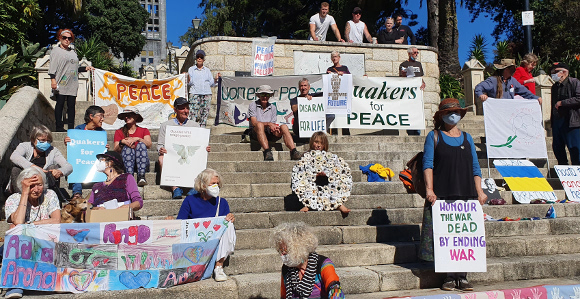
Thank you all those able to come along and join in the vigil today and to everyone who 'liked' or 'loved' the ANZAC Day Peace vigil posts on FB. It was a stunning day to stand and reflect on the terrible losses of war today and in history. We remembered those who chose to fight and those who conscientiously objected to fighting, and those combatants and non-combatants who have been or are being killed in war. Our message of Peace was shared among us and with passers by.
"War today is the failure of yesterday that leads to unimaginable human suffering on all sides. Imagine what could happen if we were willing to invest as much in peace as we currently do in preparing for war." (Paul Parker)
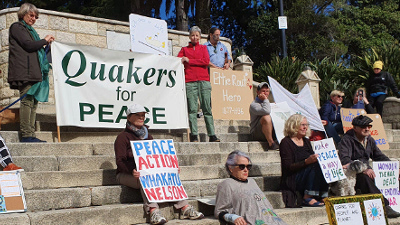
Quakers have a commitment to peace. During a civil war in the 1650s the first Quakers in England declared their opposition to war and preparations for war. Every year on Anzac Day Quakers commemorate the loss of all life in war, combatants and non-combatants
Grotesque images from Ukraine underscore that "war today is the failure of yesterday that leads to unimaginable human suffering on all sides. Imagine what could happen if we were willing to invest as much in peace as we currently do in preparing for war."
This year we add witness to the suffering of all those affected by the war in Ukraine to remembrance of all who died in the two World Wars.
Oliver Robertson from Quakers in Britain writes:
Friends, let us hold in the Light the people of Ukraine. Let us hold in the Light the people of Russia. Let us hold in the Light the people of Afghanistan. Let us hold in the Light the people of Ethiopia. Let us hold in the Light the people of Myanmar. Let us hold in the Light those affected by conflicts we have forgotten or have never even heard of, because the consequences of war will scar lives just as they are doing in Kyiv. Let us hold in the Light the people working for peace. Let us hold in the Light the people who are not.
Prayer can be a great comfort, and a powerful spur to action. But what will comfort us and what will comfort others may be very different. We need to hear the voices of people affected by today's wars, so that their lived experience can help us better understand how God is leading us in that situation. But whose voices are we hearing? Pay attention to the news you notice and the events that move you, as it can be a window into your priorities and your prejudices.
Making Connections
So how do we connect with people living close to armed conflict? During worship last weekend, one meeting put up on their walls the names of Russian and Ukrainian peacemakers. Many Friends have joined the online meetings for worship of Quakers in Kyiv, and of Friends House Moscow, which has been quietly building peace since the end of the Cold War. Whose voices should we be raising up? Which stories should we be challenging?
Oftentimes taking a pacifist stance, of faithfully maintaining 'our testimony that war and the preparation for war are inconsistent with the spirit of Christ', is itself a challenge to a dominant narrative. Its value is often to remind people that there is another way, that even when war may seem the only answer there is still a choice and an alternative.
Nonviolent resistance
That alternative is not passivity. Friends and others have long experience of nonviolent resistance. People may nonviolently demonstrate, as thousands of Russians have been this past week, and being arrested for it – including children. People may refuse to support occupiers, both passively – such as not going to work – and actively – such as damaging the weapons they are forced to make. Many of the most powerful acts of nonviolent resistance manage to both challenge the oppressive action and assert the humanity of everyone involved. When Syrian protestors gave flowers and water to soldiers, it showed both that they were not a threat (so making it harder to shoot them) and meant that the soldiers could see them as people like themselves. Such actions are not about victory over an enemy, but about turning an enemy into a friend.
Upholding people
One of the ways Quakers have often acted on our conviction that we are all God's children, that everyone has value and worth, is to support the people shunned by others. This can be about practical support, and it can also be about reminding the rest of the world that these are people too.
When I think of the people who may be shunned, I think of conscientious objectors. It will take some considerable courage to be a conscientious objector to military service today in Russia and in Ukraine, though for different reasons. Quakers have long upheld the right to refuse to kill; how can we support those who are holding firm to that stance even in the most trying circumstances? Would we support COs who come to Britain? If we didn't, are we confident others would?
When I think of people being shunned, I think of those people fleeing Ukraine who are not white. People of colour in Ukraine, students from Africa, Asia, the Caribbean, have been reported to have been hampered or attacked as they tried to flee, denied support and accommodation in Ukraine and neighbouring countries because they are not Ukrainian. How can we support them, and in so doing uphold the notion that all refugees should be treated equally?
And when I think of people being shunned, I think of Russians around the world. It's probably very lonely being a Russian in a lot of countries right now. Are we helping to ensure that any outrage over the Russian government's actions does not turn into hatred of all Russians, those with no links to the government, no influence over its actions?
Opportunities for action
Many of us may be feeling, that's all well and good, sharing stories and holding in the Light and so on, but what can we actually DO? How can we stop the bloodshed or at least mitigate its impacts?
We may be able to give money, to give time, to offer hospitality, to undertake relief work, to use our resources and our riches as individuals and as communities. But the reality is that the role we can play from here in Britain, at this time of war, may be more limited than we would like. Friends may be familiar with the hourglass model of peace work, where there is space before war and after war to carry out many actions for peace, but at the time of conflict itself, where the hourglass pinches in the middle, there is very little opportunity.
There can sometimes be a temptation to think of what great thing we can do, on a par with the times past when Quakers organised the Kindertransport or advised the Russian Tsar. But those things could only happen because of groundwork being done, relationships being built, for years beforehand. Have we built the foundations we need for such work today? Has someone else, so that our role is to support? We aren't necessarily called to be amazing. We are called to be faithful.
Building the commonwealth of heaven on Earth
One of the things we can get from our faith and our long-established testimony against war is a clear vision of the world we want to see, the divine commonwealth that God is calling us to live in. Some of the greatest strides towards that world have come after very dark times. What are the changes that are needed? What work do we need to do now to clear the way for such changes to happen? What are the existing institutions and practices that need to be celebrated and maintained, even if they are imperfect? What would need to happen for Russia's neighbours not to see it as a threat? What would need to happen for a military alliance in Europe to feel unnecessary?
As Paul Parker was quoted last month, "war today is the failure of yesterday that leads to unimaginable human suffering on all sides. Imagine what could happen if we were willing to invest as much in peace as we currently do in preparing for war."
Just imagine Friends. Then let us get to work.
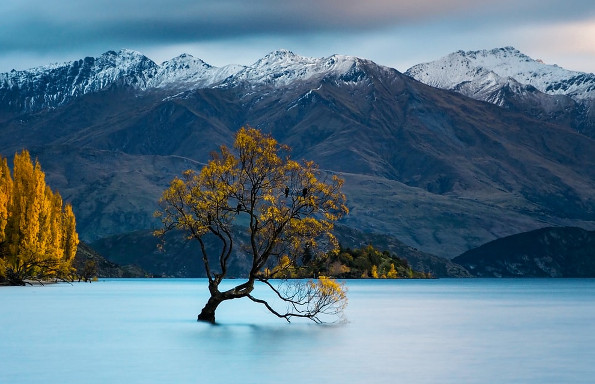
Quakers have been active in the Forum since its beginning 2 years ago. Now our Meeting has become an associated organisation of the Forum. This reflects our commitment to sustainability, care for the earth and love of nature. Climate justice is a core Quaker value. In signing up we commit to supporting the work of the Forum - joining in with its projects, and creating our own.
Friends act on behalf of the climate and the world in myriad ways. Living simply and advocating peace and justice lead many of us to ways of life that minimise our impact on the planet. Nationally we have financially supported Generation Zero, and Friends have involved themselves with that group, with 350.org and Extinction Rebellion., Greenpeace (Quakers were among the founders of Greenpeace), and other campaigning groups. Internationally, Quaker organisations work at United Nations level, at COP meetings, and in national and international action groups.
Locally, a group of Friends is working to create community conversations on climate change, aiming to support as many people as possible to engage with the issue of climate change and become active in the Forum and/or other groups - to urgently increase pressure on government to end fossil fuel use and replace it with renewable energy sources. We welcome all invitations to bring that conversation to you!
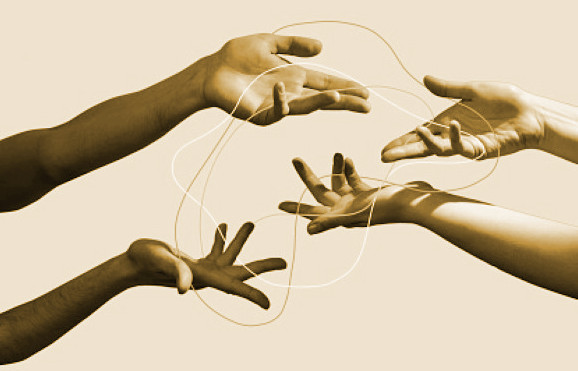
Quakers in Nelson have resolved the dilemma of being divided by vaccination status. Our position was guided by Quaker values of equality and unity and with love and compassion for all those who worship with us. We wish to provide safe spaces for Friends and for the community who may choose to join us at a Meeting.
We have been aware of the pain experienced by those whose whanau have compromised health or who themselves have underlying conditions, and want to be safeguarded from those most at risk of contracting Covid, the unvaccinated. We want to reassure anyone seeking a spiritual home that their health is our concern and they can participate in Meeting knowing those around them have vaccination passes. From now on we will meet every Sunday at 9am with vaccination passes.
We are equally aware of the pain experienced by those who for a variety of reasons are unable or unwilling to be vaccinated. Some stand in a place where their fear of the virus is matched or exceeded by their fear of the vaccine. Some fear an unknown future, others hold beliefs that are incompatible with vaccination. In such a fearful moment in our history the solace of a spiritual home is to be valued. We welcome all who wish to sit with us in listening silence, vaccinated and unvaccinated. From now on we will meet every Sunday at 10.30am without the need for vaccination passes.
Please join us, just make sure which Meeting to attend. If fully vaccinated you are welcome to attend both.
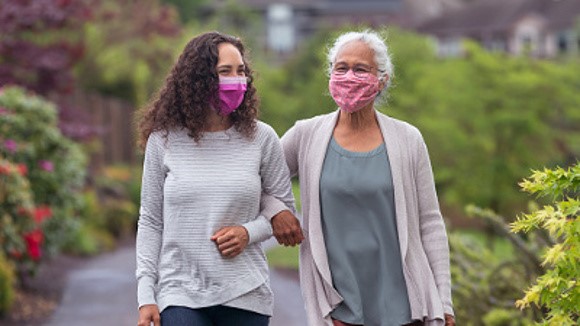
Quakers, like many other faith groups and community groups, keep talking and listening to find a way to continue our connections. We are aware that there are people yet to vaccinate and people unable to risk being with those who are unvaccinated. Our skills of empathy and nonviolent communication grow.
In the past during lockdowns in Alert Levels 4 and 3 we relied on Zoom for silent Meeetings for Worship, for discussion groups and spiritual nurture. In Alert Level 2 we were eager to get back to the Meeting House and be together. The call for Zoom Meetings fell away, though we were still willing to offer it as an alternative or adjunct to face to face gatherings. Being together just trumped technology.
The change to the Covid Protection system, away from Alert Levels and elimination to reliance on suppression through vaccination and the 'traffic light system' brings with it many greater challenges. The arrival of Delta in Nelson, Richmond and Tasman has heightened the tensions around protecting us all including those who join with us in worship and fellowship. Though not unexpected in a suppression model it serves to focus our minds.
As in every other corner of our community we are called to find a way forward that respects the situations of individuals grappling with fear: fear of the virus, fear of the vaccination; fear of the vaccinated and fear of the unvaccinated; fear of mandates designed to protect us all, and fear of feeling forced to make choices with unwanted consequences; fear of all that remains outside of our control. We continue to hold each other in the Light as we work our way towards a solution that respects all experiences whilst seeking the greatest good..
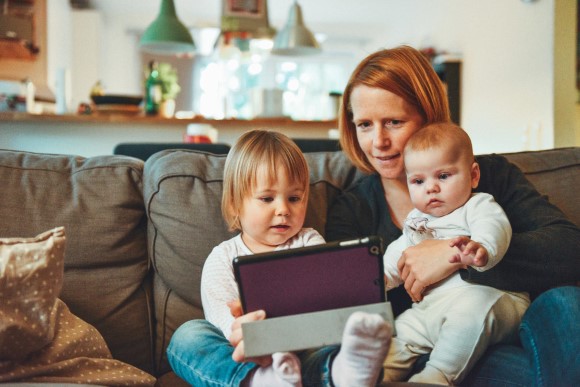
Because of Covid-19 Alert Level 2 rules we are unable to open our Meeting House publically. However, we are still meeting every Sunday at 10am by Zoom, with a slightly changed format - rather than an hour long Meeting for Worship we have a half hour, followed by a half hour for connecting with each other. For those who want to gather in person a Friend has offered their home where different rules apply, though obviously numbers are limited and there is no public access.
If you want to get together with others at John and Anthea's house or you wish to join the Zoom Meeting then please message us on quakers-in-nelson.org.nz , and we'll provide you with the Zoom link or if numbers permit John's address. Everyone is welcome.
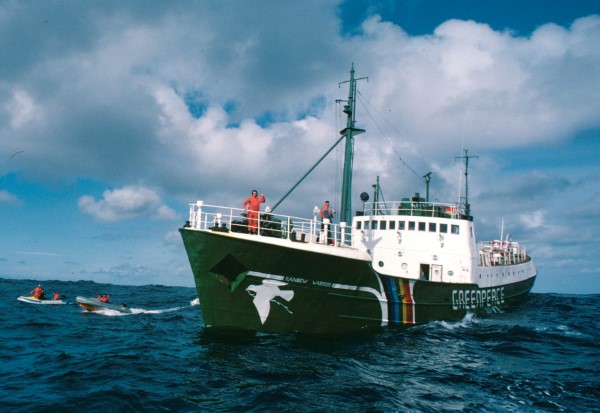
The Rainbow Warriors of Waiheke Island is a film by Suzanne Raes, made in 2009. It records the memories of 6 crew members of the Greenpeace vessel which sailed to Iceland to oppose whaling and to the South Pacific to stop the French nuclear testing programme. The end came in 1985 with the bombing of the Rainbow Warrior by French Secret Service spies. One crew member was murdered. The bombing boosted the movement to ban nuclear weapons from the South Pacific. At the time of its sinking the ship had been about to sail to Moruroa in French Polynesia to protest against continuing nuclear testing by the French on that isolated atoll.
The film interposes archival footage of the adventures of the Rainbow Warrior and its crew. At 1 hour 30 it is a compelling story of courage and committment.
Rien Achterberg, one of the crew members, shared his memories and reflections on this part of our anti-nuclear history at a showing organised by Peace Action Network earlier this month. A full house gathered to hear Rien, ask plenty of questions and watch the movie. Right now Peace Action is hoping to organise another showing in Motueka.
It was very timely to be able to see the movie in the same month as Hiroshima and Nagasaki Days which were commemorated by Quakers in Nelson and others at a Peace Vigil on Saturday August 7th .
On 6 August 1945 US forces dropped the first atomic bomb “Little Boy” on Hiroshima leaving 100,000 -180,000 people dead and 63% of buildings destroyed. Three days later a larger bomb “Fat Man” was dropped on Nagasaki leaving 50,000-100,000 dead and 22.7% of its buildings consumed by fire. Thousands more were hit with generational defects that are plaguing a section of the populace to this day.
We remembered the men, women and children who lost their lives or were harmed at Hiroshima, Nagasaki and through nuclear testing. We remembered all people who have suffered the violence of war and those who live in conflict zones.
Hiroshima & Nagasaki Days commemorate the tragedy 76 years ago which completely destroyed the two cities and left the country to deal with a dreadful fate in its aftermath. They remind the world that all wars are terrible, and nuclear warfare even more so. It reminds thousands of politicians, diplomats, and envoys around the world that diplomacy is the only option while navigating geopolitics in the 21st century. Nine countries in the entire world currently possess more than 13,000 nuclear weapons and have failed to sign the UN Nulcear Ban Treaty.
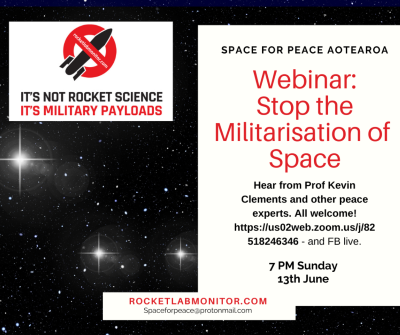
Peace Action Network Whakatu held a webinar watch party in mid June to see Professor Kevin Clements and other peace activists explaining the links between Rocket Lab and the US Military through its US ownership and its weapons targeting systems payloads. Quakers hosted the webinar and joined Peace Action Nelson on June 21st to demonstrate against the use of weapons in space. The Quaker Peace Testimony calls for opposition to all war and preparation for war.
We were grateful to Auckland Peace Action for providing us with copies of their excellent leaflet, and a banner. You can read that leaflet on the One Quaker View page. Most people we talked to had little understanding of the facts or consequences of Rocket Lab contributing to war in space, still thinking of Rocket Lab as a plucky little New Zealand company sending rockets into space - just for the heck of it.
Below is a letter from the Peace Foundation which sets out the threats to New Zealand’s security, sovereignty and national interests resulting from space-launch activities by Rocket Lab:
PEACE FOUNDATION COMMITTEE’S REPLY TO THE PRIME MINISTER RE: ROCKET LAB, JUNE 2021
To the Prime Minister of New Zealand
Parliament House, Wellington
CC. Minister of Foreign Affairs, Minister of Business, Innovation and Employment, Minister for Disarmament and Arms Control, Minister of Defence, Public Advisory Committee on Disarmament and Arms Control
Re: the government response to our letter to the Prime Minister of March 1, 2021, regarding threats to New Zealand’s security, sovereignty and national interests resulting from space-launch activities
Dear Prime Minister,
Thank you for your message acknowledging receipt of our letter of March 1, 2021. We also acknowledge responses to our letter received from the Minister for Disarmament and Arms Control, Hon. Phil Twyford (8 April) and the Minister for Economic and Regional Development, Hon. Stuart Nash (14 April). We are replying to these letters and to other government statements on this issue collectively.
We remain deeply concerned that the New Zealand Government (NZG) allowed Rocket Lab to launch the Gunsmoke-J payload, to enable the US Army Space and Missile Defence Command to improve battlefield weapons targeting. We again call on the NZG to suspend, with immediate effect, the granting of licences for all Rocket Lab payloads for any military clients, pending a full review of the Outer Space and High-altitude Activities (OSHAA) Act 2017 with parliamentary oversight. New Zealand does not need to permit legally and morally questionable military payloads in order for the space industry to be successful.
We look forward to our being consulted on the forthcoming review of the operation and effectiveness of the OSHAA Act, and seek an assurance that such public involvement in this review will occur.
Our concerns, further elaborated below, are these:
1. Rocket Lab is drawing New Zealand into the web of US space-based war-fighting plans and capabilities which increase international tension and mistrust, and undermines ourindependent New Zealand foreign policy.
2. Rocket Lab is making Mahia Peninsula a potential target for US adversaries, and Mahia mana whenua believe Rocket Lab misled them about the intended military nature of some of its activities.
3. We strongly oppose the idea that it is in New Zealand’s national interest to allow the launch of satellites that aim to improve weapons-targeting capabilities, or that this is a “peaceful” use of space.
4. The level of secrecy around some of Rocket Lab’s activities is contrary to norms of democratic accountability and undermines citizens’ faith in the government
5. Due to technical and political realities, once a satellite is launched, it is impossible for the NZG to ensure that the US military uses it only for defence, security or intelligence operations that are in New Zealand’s national interest. For example, a subsequent software update could invalidate the NZG claim that it can verify that satellites launched by Rocket Lab comply with the New Zealand Nuclear Free Zone Act 1987.
Rocket Lab is drawing New Zealand into US military plans and capabilities
We are deeply concerned at, and opposed to, the extent to which Rocket Lab’s activities – in particular, the launch of US military communications, surveillance and targeting satellites, whether they are developmental or operational – is drawing New Zealand deeper into the web of US space-based war-fighting plans and capabilities.
This undermines New Zealand’s independent foreign policy and raises the question of how deeply we, as New Zealanders, want to be embedded into US military activities. A significant number of New Zealanders, especially locals from Mahia Peninsula, are worried about this issue. As RNZ reports, “Billboards have gone up around [Mahia] saying: “No military payloads. Haere Atu (go away) Rocket Lab””.
In our initial letter, we raised concerns about the 2016 NZ-US Technology Safeguards Agreement (TSA). The TSA allows the US Government (USG) to veto any space launch from NZ territory or any import of space-launch technology to NZ, simply by declaring that such activity would not be in US interests. This is a partial but significant abrogation of NZ sovereignty, which has been surrendered to help a private, foreign-owned company that has received funding from the Regional Growth Fund.
Since September 2013, Rocket Lab has been 100% US-owned. The TSA was signed in 2016 in large part to allow Rocket Lab to import sensitive US rocket technology into New Zealand. In other words, by signing the TSA, the NZG granted effective sovereignty over all NZ space-launch activity for the commercial benefit of a 100% US-owned Company. That company is now making money by helping the US military develop space-based war-fighting capabilities, including weapons targeting. This is contrary to the independent NZ foreign policy that the government pursues.
We are not aware of any NZG response to the concerns we raised in this matter. We again urge the government to consider renegotiating the TSA so as to remove the portion that gives the USG effective sovereignty over New Zealand space-launch activities.
Rocket Lab is making Mahia a potential target for US adversaries
Rocket Lab’s current activities make Mahia a potential target for espionage or attack by US adversaries like China and Russia, for at least two reasons. First, space-launch technologies are in many critical aspects identical to missile technologies. Rocket Lab is using cutting-edge US rocket technology to launch US military satellites into space from Mahia – which is precisely why the TSA was negotiated. To America’s adversaries, there is very little distinction between that, and the US military having a missile launch site on Mahia Peninsula. Second, Rocket Lab is launching satellites that could help the US and other militaries that buy US weapons to improve the targeting of those weapons. And as defence expert Paul Buchanan notes, launching satellites like Gunsmoke-J puts New Zealand closer to the sharp end of the US “kill chain”.
Excessive secrecy about Rocket Lab’s activities undermines democratic accountability
On 24 April 2021, The Gisborne Herald reported that it had obtained the pre-launch application for Rocket Lab’s Gunsmoke-J payload, and that five out of seven paragraphs giving specific information about the payload were completely redacted. The photograph published by the Herald (below) suggests this represented roughly 95% of all information about the payload, and in fact, only two sentences were not entirely redacted. Of those, one reads: “The US Army has stated that this satellite will not be utilised for operations…” and the rest of the sentence is redacted. This level of secrecy is unacceptable and undermines democratic norms of transparency and accountability. As New Zealand citizens, we are being asked to accept that the Gunsmkoke-J payload, which is intended to improve battlefield targeting, is in the New Zealand national interest. Yet we are allowed to know virtually nothing about it.
Ministerial oversight alone cannot ensure payloads are in NZ national interest
The replies we received from the Minister for Economic and Regional Development and the Minister for Disarmament and Arms Control both point to the requirement that payloads “are consistent with New Zealand law and national interest”, and in particular, with the OSHAA Act and 2019 principles for payload permitting signed off by Cabinet. The latter affirm that activities that are not in the New Zealand national interest, and which the government will therefore not permit, include “payloads with the intended end use of harming, interfering with, or destroying other spacecraft, or space systems on Earth; [or] payloads with the intended end use of supporting or enabling specific defence, security or intelligence operations that are contrary to government policy.”
On March 9, after he had approved the Gunsmoke-J payload, Minister Nash stated in parliament that he was “unaware of the specific military capabilities” of the payload, and had based his decision to permit the launch on advice from officials in the NZ Space Agency. We believe that oversight of this area, which is critical for New Zealand sovereignty and national interest, deserves and requires much more active ministerial engagement. How can Minister Nash uphold the national interest if he does not know the specific capabilities Rocket Lab is launching into space for a foreign military?
By allowing the launch of the Gunsmoke-J payload, the government is asserting that supporting the development of US weapons targeting capabilities based in space is in New Zealand’s national interest. We strongly oppose this idea. One of the objectives of the 1967 Outer Space Treaty, to which New Zealand is a party, is to “promote international co-operation in the peaceful exploration and use of outer space.” While space-related activities have always included military elements, we reject the idea that helping to develop space-based weapons targeting capabilities is a “peaceful use” of space and can be reconciled with New Zealand’s national interest.
Second, once a satellite is launched, how can the NZG possibly know which “specific defence, security or intelligence operations” it will be used for? Does the Minister expect the US military will ask the permission of the NZG every time it wants to use Gunsmoke-J satellite, or later iterations of the technology it is being used to advance, to target a weapon on Earth? That would be an unreasonable assumption. But if that is not the case, how can the NZG know whether the operations of a given payload will be used to support operations that are not in New Zealand's interests? We believe the NZG cannot know this with certainty, and therefore should stop issuing launch permits for all military payloads pending a full review of the OSHAA Act 2017, to include parliamentary oversight.
Software updates make it impossible to know all end-uses of a satellite
In response to the concerns in our letter of March 1, the NZ Space Agency responded that it has technical expertise “in house” to ensure that all launches comply with the 1987 Act, and can draw on expertise from the MoD, NZDF, and NZ intelligence agencies in making determinations of this type. This is hard to appreciate, as it appears to be technically impossible.
First, the ability to distinguish between systems used to support the targeting only of non-nuclear weapons and those which can support the targeting of non-nuclear and nuclear weapons requires expert technical knowledge of nuclear command and control systems. We are surprised that members of the NZ Space Agency, MoD, NZDF, and intelligence agencies believe they possess such expert knowledge. We request clarification about how and where they developed this expertise, consistent with not breaching the 1987 Act.
Second, the NZG’s assurance that it can verify that satellites launched by Rocket Lab will not breach Section 5 of the 1987 Act – that is, by contributing to the targeting of nuclear weapons in future or to the development of systems designed for that purpose – is deeply problematic in technical terms. Once in orbit, a satellite is very likely to receive regular software updates, like any modern communications equipment. Any such update sent to a satellite launched by Rocket Lab could well immediately invalidate the NZG claim that it can verify the satellite will not breach the 1987 Act. In effect, such software updates could leave the NZG unaware as to the precise end-uses of any satellite.
As discussed above, the only way around this problem is if:
a) the NZG pre-emptively screens all software updates that the US military intends to deploy to satellites launched by Rocket Lab which have possible targeting applications – such as Gunsmoke-J; and
b) the NZG can veto any update that it believes might enable breaches of the 1987 Act. Clearly, the USG is not likely to agree to this, especially as the 2016 TSA establishes precisely the opposite legal and political hierarchy: it gives the USG effective sovereignty over NZ space-launch activity.
In this regard, we note the concerns that the Public Advisory Committee on Disarmament and Arms Control (PACDAC) expressed in their letter of 26 June 2020 to the Prime Minister, released under the Official Information Act (OIA). PACDAC noted that “it might be appropriate for you as Prime Minister to obtain legal advice from the Attorney-General on the application of the Act to the space launches from Mahia Peninsula.” Per our rights under the OIA, we request a copy of any such legal advice from the Attorney-General.
PACDAC also advised the Prime Minister in that letter that,
“the following two initiatives would also be helpful in ensuring compliance with the Act;
(a) Future written statements supplied by the US Government to the NZ Government under the bilateral Technology Safeguards Agreement, pertaining to future proposed space launches, contain a specific statement that the content of the payload will not be used, at any time, to aid or abet any person to have control over any nuclear explosive device.
(b) Future payload permits, granted by the NZ Minister for Economic Development under the High-altitude & Outer Space Activities Act, either contain a specific affirmation that the launch is consistent with the NZ Nuclear Free Zone, Disarmament and Arms Control Act; or is accompanied by a statement to the same effect.”
We strongly support these proposals and request copies of any and all responses from the Prime Minister or her office to PACDAC with regard to them.
In conclusion, Prime Minister, we urge your government to put a halt to the increasing integration of New Zealand into the US war-fighting machine, of which space-based technologies and strategies are an increasingly important component. In doing so, we ask you to respect the rights of the mana whenua of Mahia, who believe they have been misled by Rocket Lab about much of its intended use of Mahia Peninsula. And we ask you to stand up for the independent foreign policy that the government supports, specifically by rescinding the portions of the TSA that grant the USG effective sovereignty over space-launch activity in New Zealand.
We look forward to your responses to the specific questions and concerns we have raised here, together with those raised in our 1 March letter.
From the Peace Foundation’s International Affairs and Disarmament committee, chaired by Richard Northey.
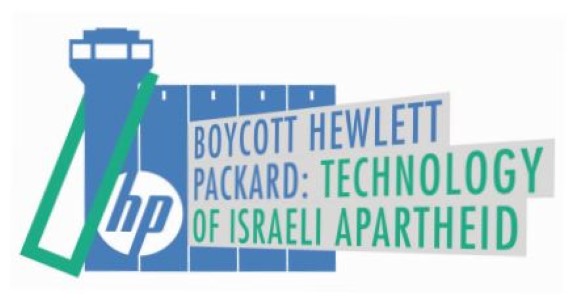
Quakers in Nelson have since 2018 backed the boycott of goods produced by Israel in occupied Palestinian Territories. In May 2021, we extended our support for the 16 year Boycott, Divestment & Sanction movement by calling on all Quakers and others to boycott Hewlett Packard.
We thank https://www.palestinecampaign.org/campaigns/hp/ for the following explanation for our action:
The Hewlett Packard Company (HP) has become notorious for its direct involvement in the Israeli occupation, providing the Israeli regime with technologies of surveillance and control used in the occupied Palestinian territory. In 2015, the company underwent major restructuring, involving a split and subsequent mergers and spin-offs, making it difficult for global civil society to determine the current state of its complicity. However, HP corporations are still profiting from Israel’s abuse and oppression of Palestinians:
- HP Enterprise provides servers to the State of Israel for its population registry. IDs issued based on this registry determine one’s level of rights. Under this system, Jewish citizens have more rights than Palestinian citizens, who have more rights than Palestinians from the West Bank, Gaza, or East Jerusalem.
- HP Inc. is the exclusive provider of computers to the Israeli military, which carries out the occupation of the West Bank, including East Jerusalem and the Gaza Strip, and in the last decade has carried out the brutal siege of Gaza.
- HP Enterprise provides servers and technology used in Israeli prisons. Israel’s prison system is used to suppress Palestinian political activity, and to stifle opposition to its policies. By helping Israel run its prisons, HP is at the heart of Israel’s use of mass incarceration to undermine Palestinian opposition to apartheid.
We hope that by choosing other products when you need another computer or printer we can impress on HP that people do care about what is happening in Israel / Palestine and want them to stop supporting Israeli apartheid.
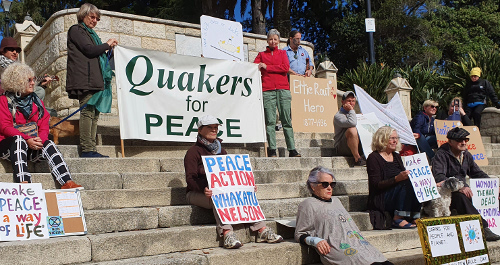
Quakers in Nelson were joined by friends from the newly formed Peace Action Network on Anzac Day, Sunday April 25th to commemorate all loss of life in war, combatants and non-combatants. Those present held posters saying "make peace a way of life" and "honour the war dead by ending war". We had intended for part of the vigil to be silent but there was a lot going on - a guy playing peace songs and his guitar, people learning about Ettie Rout and her work to safeguard the sexual health of soldiers in WW 1, others discussing the comments on our Facebook page which expressed the view that an Anzac Day Peace vigil should be held on another day.
Everyone gathered felt the same concern about the myths of militarism, that somehow war is inevitable and but for the fact that our soldiers fought and died for the freedoms we enjoy today we would not be able to sit in the sun on a warm autumn day and lament war. War begets war. Had Germany not been so humiliated and punished economically after WW1 there just might not have been a WW2. Had the imperialist European nations not been so hungry to redivide the continent there might not have been a WW1.
We can hope that the appetite for warfare will never be rekindled in New Zealand, and that the longing for peace across the globe is fulfilled.
If you would like to join the Peace Action Network and plan future educational and witness actions, the next meeting is on Thursday 3rd June at 30 Nile street, Nelson, 5.30pm for a 6pm start. You are invited. There may be soup.
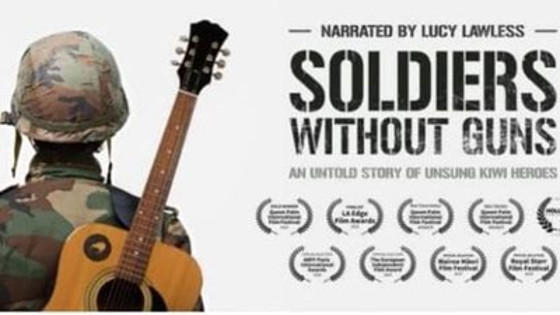
You are invited to the next gathering to discuss the focus for Peace Action Nelson, Sunday April 11th, 12 noon, at 30 Nile Street, Nelson.
Two Friends, Rex Hunt and Gwen Struik, were among the last members of the Nelson Peace Group that finally disbanded 20 odd years ago. Now they and others hope to energise a new generation of peace activists. An initial meeting on February 28th arose from a viewing of the movie Soldiers without Guns at Victory Community Centre at the beginning of February.
Liz Remmervaal, Director of World Beyond War Aotearoa, brought the NZ made movie to Nelson, telling the story of how a bunch of unarmed Kiwi soldiers brought peace and reconciliation to Bougainville after 10 years of civil war and 14 failed peace agreements. It is a David and Goliath story of a Pacific Island people rising up against Rio Tinto, the largest mining corporation in the world. In 1997 the NZ army stepped into the conflict with a radical new plan. Instead of taking guns into the war-zone, unarmed soldiers took guitars and culture. This idea was condemned by the national and international media - no-one thought it could work. The peacekeepers used Music, Maori culture and Aroha to end the worst civil war in the Pacific’s history.
This inspiring story of how non-violence can overcome entrenched enmities and the power of big money demonstrates an alternative narrative for our Defence Forces, one in which militarism is replaced by peacekeeping, our Navy becomes a Pacific coast guard, and warriors become emergency personnel.
Do you want to be part of creating change - in the role of NZ Defence Forces, in the amount of Government budget devoted to war preparations, in NZ's willingness to join other people's wars, our official attitude to the use of killer robots, NZ's membership of the 5 Eyes network, or any other issue relevant to peace in Aotearoa?
Then please join us to discuss the focus for Peace Action Nelson on Sunday April 11th at 12 noon, at 30 Nile Street, Nelson.
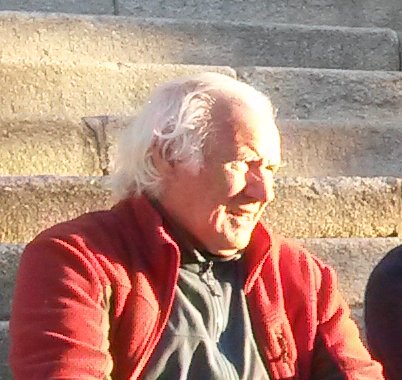
Jim was well known in the Nelson community as a longstanding couples' counsellor and psychotherapist, and as a tutor on the counselling course at NMIT, where he is remembered as “the first good man" many students ever met. He was also a much appreciated member of the Quaker community. Jim was honoured by a large gathering at Fairfield House by family in New Zealand, Australia and Sweden, former colleagues, clients, students and supervisees, members of counselling and psychotherapy organisations he was part of, representatives from his blood cancer group, and Quaker friends. Claire, Jim's wife, called for a time of silence in acknowledgement of Jim's commitment to his Quaker life.
Jim became part of our Quaker community about 13 years ago out of curiosity about his spirituality and Quakerism. He spoke about passing by the Meeting House on his way to work for years, promising himself that one day he would drop in. Jim became an integral part of the Meeting, joining in and leading discussion groups on topics such as forgivenenss, compassion, trust, hatred, grief and grieving. He participated in public Quaker Quest discussion groups, especially on his long term commitment to peace and peace activism. He was a frequent participant in peace vigils at the Church Steps on Anzac Days and Hiroshima and Nagasaki Days.
Jim served Quakers nationally for several years on the Peace and Service Committee. He enrolled in Otago University National Centre for Peace and Conflict Studies where Quaker Kevin Clements became the supervisor of his Masters Degree. He graduated in 2015. His thesis entitled “Working with the Impasse in Couple Relationships while working towards World Peace", submitted in December 2014, encapsulates Jim's world view.
Jim struggled with highly ambivalent feelings about spirituality and God. He came to understand that he despised God-believers whilst feeling he might be missing out by not being one. In the months before his death Jim resolved this conflict to his satisfaction. The fruit of his spiritual awakening is recorded in the last article of several he wrote for our website. You can read that under One Quaker's View. To quote from it here:
“I have spent a life-time trying to understand and create peace, non-violence and harmony, in my work and in my relationships. During the home discussion I thought about what was helpful in this pursuit. I had long kept in store a bundle of attributes any of which would contribute to more harmonious relationships. I believed that harmony was better than disharmony; that love was better than violence; that peace was better than war. I had long been convinced that violence does not work. In the long-term peace and non-violence are much better options. I concluded that this is my God: a bundle of attributes which promote peaceful harmonious relationships; empathy, compassion, love, generosity, honesty, trust etc, etc. Perhaps this was my own version of God. When I am faced with a relationship within which I am struggling I call upon my God to suggest something which I may be overlooking. To me, my God is a resource I call on when I am struggling. I felt relief, I had achieved what I set out to achieve." Rest in Peace Jim.
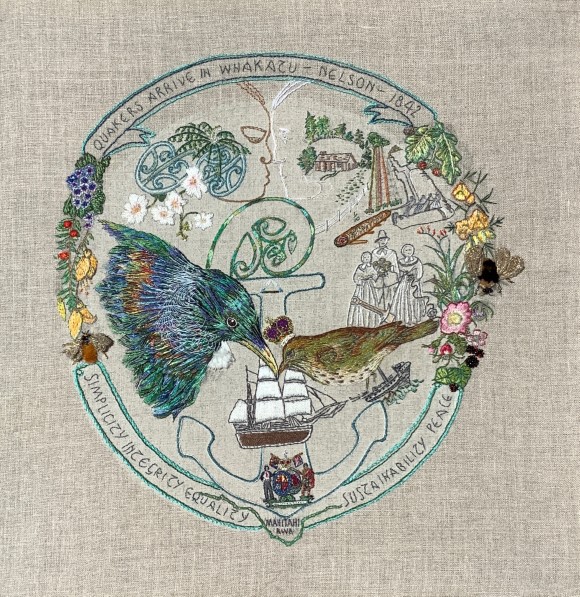
The third of three embroidered roundels is completed. All three were designed by Lizi McLeod-Taepa, researched by Lizi and others, and embroidered by Patricia Morrisey and others. The three embroideries record early Quaker history, the arrival of Quakers in Nelson in 1842, and subsequent relations with tanga whenua. The stories embedded in the embroideries will be told in multiple touch points on each roundel when they are uploaded to our website.
An article on the embroideries is to be included in the next issue of Threads magazine. Patricia was a member of the Nelson Embroideries Guild. An excerpt from that article by Lawrence Carter (who provided research and some stitches) records:
Roundel 3 is the most detailed, and tells the complex story of Quakers' arrival in Nelson as part of European settlement in the 1840s, and their relationship with M?ori. The design deliberately contrasts indigenous and introduced elements. Efforts to implement the testimonies are alluded to in the representation of the M?ori greeting or hongi, mirrored in the meeting of the finely-worked thrush and tui. Points of tension are shown by the inclusion of the surveying instrument: a reference to the Quaker surveyor John Cotterell who was killed in the Wairau conflict in 1843. The New Zealand Company employed a number of Quaker surveyors, including Cotterell, and put them in an invidious position by its dishonest land practices. Cotterell's house in Nelson, also shown, became the first Friends' meeting house in New Zealand when it was purchased by English Friends in 1853 and gifted for that purpose. In the website version of this image, touch points will allow exploration of the many detailed stories.
Lizi McLeod-Taepa adds:
I chose to design and emphasise a bi-cultural acknowledgement of our histories, by symbolizing the 'Indigenous' on the left and the 'Introduced' on the right (of Roundel 3). My desire is for these touchstones to encourage and promote peace and a deeper understanding of the truth of our colonisation and de-colonisation process.
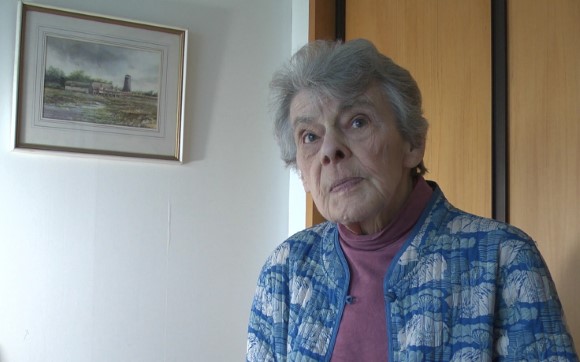
Patricia died after living with illness with great grace, humour, and an inquisitive spirit about what was coming next. She preferred to care about others and offered kind support to all who needed it, whether over a cuppa, a game of Scrabble or with a listening ear.
She died early on Wednesday 21st October. Next morning her family and friends gathered at her home to be with her and farewell her. There will be an opportunity to all who knew her to remember Patricia in the near future at a memorial service.
There are those of us who enjoyed her hospitality at our monthly Quaker Discussion Groups, as we enjoyed her intelligence and thoughtfulness. Others worked with her a little or a great deal on the design and execution of the Nelson Quaker Embroideries, and appreciated her patience as she showed us yet again how to do Quaker stitch (it’s a real thing) or used her skill to thread our needles. The embroideries will be one of our reminders of her wonderful artistry. Other friends were drawn to her through weekly Friday afternoon Scrabble games , to enjoy her mastery of words. We all valued her humble service as our provedore, keeping us supplied with gluten free flapjacks, buttery flapjacks, and other goodies. Those who stayed in our Meeting House accommodation will remember her for her generosity of time and care. Quiz nights for her birthday celebrations are indicative of her love of knowledge and pleasure in community.
Elizabeth was staying over the night she died. She wrote: “I found Patricia quietly, peacefully, lying across her bed. She looked asleep and so vulnerable I wanted to gather her up - and I could have done, she had become so slight. I fetched Sandie to make sure I wasn't imagining things (one has such odd thoughts!), then just as I telephoned Donald, her beloved son, he arrived at the door.
Patricia was keen to re-enter the earth from which she came as simply as possible, so we wrapped her in her own cotton sheets. The council arranged a plot for her and the Sexton of Wakapuaka Cemetery prepared it. The burial took place the day after her death, Thursday 22 October at 2.30 pm, on a beautiful sunny day under blue skies and tall Gum Trees. She is facing the sea.
Because I thought she had bright wings hidden under her clothes, this has become my favourite poem 'in memoriam':
ANTIDOTES TO FEAR OF DEATH by Rebecca Elson
Sometimes as an antidote
To fear of death,
I eat the stars.
Those nights, lying on my back,
I suck them from the quenching dark
Til they are all, all inside me,
Pepper hot and sharp.
Sometimes, instead,
I stir myself
Into a universe still young,
Still warm as blood:
No outer space, just space,
The light of all the not yet stars
Drifting like a bright mist,
And all of us, and everything
Already there
But unconstrained by form.
And sometime it’s enough
To lie down here on earth
Beside our long ancestral bones:
To walk across the cobble fields
Of our discarded skulls,
Each like a treasure, like a chrysalis,
Thinking: whatever left these husks
Flew off on bright wings.
The last line (well all of it really) moves me so deeply."
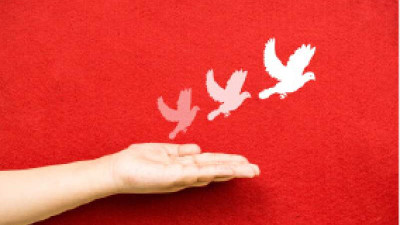
The aim of interfaith dialogue and activities is to promote good relations, understanding and respect among the followers of different faiths and to cultivate tolerance, compassion, unity, and peace in our community, our nation, and our world. In Nelson an Interfaith Committee has organised a programme of interfaith events from the 11th October to the 18th October.
Quakers in Nelson will host a Meeting on Saturday 17th October at 12.30pm - 1.30pm. Everyone is welcome.
The full programme is : Sunday 11th October 4pm - Queens Gardens, Nelson (Hardy Street entrance – through the gate and turn to the right)
Wednesday 14th October 6pm - Nelson Cathedral, Nelson
Saturday 17th October 12:30 – 1:30p - Quaker Meeting House, 30 Nile Street, Nelson
Sunday 18th October 2:30pm – Broadgreen Gardens, Stoke, Nelson. (on the right of the building looking from Nayland Road).
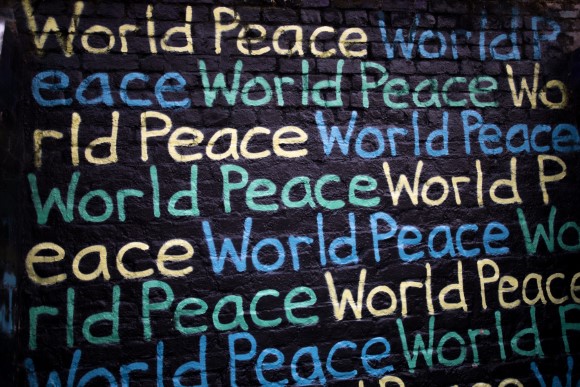
photo by Humphrey Muleba Unsplash
COVID-19 AND HUMANITARIAN DISARMAMENT
Open Letter from Civil Society
The COVID-19 pandemic has taken a heavy human and economic toll and shattered lives in many countries. The pandemic has also underscored that global solutions should be used to address global problems, in the current crisis and after it ends. Now is the moment to reflect on the world as it is and consider a better alternative for the future. A “new normal” should go beyond the field of public health to deal with other matters of ongoing international concern, including the humanitarian consequences of arms and armed conflict as well as peace and security more broadly.
Humanitarian disarmament, an approach to governing weapons that puts people first, can help lead the way to an improved post-pandemic world. Humanitarian disarmament seeks to prevent and remediate arms-inflicted human suffering and environmental damage through the establishment and implementation of norms. Originating in the mid-1990s, it has generated four international treaties, been recognized with two Nobel Peace Prizes, and inspired ongoing efforts to reduce other arms-related harm.
Humanitarian disarmament’s twin pillars of prevention and remediation should guide the allocation of resources to advance human security. COVID-19 has caused people to take a fresh look at states’ budgetary choices. To prevent arms-inflicted harm, governments and industry should stop investing in unacceptable weapons as well as strengthen the protection of civilians from the use of weapons and ensure arms transfers comply with international law. The money spent on nuclear arsenals and other military expenses could be better used for humanitarian purposes, such as health care or social spending. To remediate harm, governments should redirect money to programs that assist victims, restore infrastructure, clear explosive ordnance, and clean up conflict-related pollution. Funding the multilateral institutions that set standards on these topics and ensure their implementation would also advance humanitarian disarmament’s goals.
The principles of inclusion and non-discrimination, which are fundamental to humanitarian disarmament, should inform measures to address the inequalities that COVID-19 has exposed and exacerbated. The pandemic has increased the challenges faced by conflict survivors and other persons with disabilities due to the vulnerability of certain groups, their inability to access health care and basic necessities, and restrictions on aid workers. A humanitarian disarmament response would ensure that such inequality and marginalization do not become entrenched. It would also promote more sensitive programs than existed before. States and humanitarian actors should broaden efforts to involve affected individuals and diverse populations in decision-making, gather data disaggregated by gender, age, disability, and ethnicity, and deliver assistance in a non-discriminatory manner.
Inclusivity and accessibility should underpin diplomacy as it emerges from its current digital state. Since the pandemic led to a global lockdown, in-person disarmament meetings have been canceled, postponed, or held digitally. While face-to-face meetings have important advantages, once they resume, the international community could increase inclusivity and accessibility by permitting meaningful online participation at multilateral meetings. Individuals, including survivors and other persons with disabilities, who are unable to travel due to lack of funding or visa restrictions, could add their voices to critical discussions about setting and operationalizing norms.
Finally, international cooperation should become a standard way to address global issues, as it is in humanitarian disarmament. Humanitarian disarmament treaties, which mandate international coordination, information exchange, and resource sharing, offer models of cooperation. States should adopt a cooperative approach to addressing the human and environmental harm inflicted by arms and increase their assistance to affected states. Such a cooperative mindset, reinforced by the pandemic experience, should carry over to other multilateral efforts to create, implement, and adapt international norms.
As the world transitions to a post-pandemic reality, we call on states, international organizations, and civil society to follow humanitarian disarmament’s lead. The international community should prioritize human security, reallocate military spending to humanitarian causes, work to eliminate inequalities, ensure multilateral fora incorporate diverse voices, and bring a cooperative mindset to problems of practice and policy. Together we can reshape the security landscape for the future and help create a new—and improved—“normal.”
You can learn more about Humanitarian Disarmament on the website https://humanitariandisarmament.org/ which originated in the conference “Humanitarian Disarmament: The Way Ahead,” organized by Harvard Law School’s Armed Conflict and Civilian Protection Initiative in 2018. This event gave global leaders in humanitarian disarmament an opportunity to reflect on the state of the field and strategise about its future.
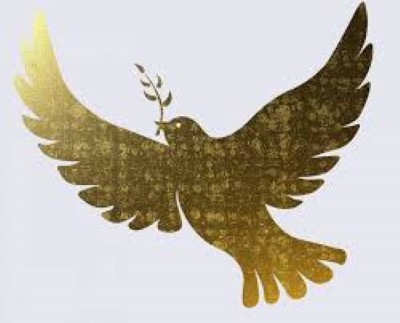
While we were preparing our posters and fliers, our banners and advertising for Peace Vigils to commemorate the 75th anniversary of the atomic bombing of Hiroshima and Nagasaki on August 6th and 9th 1945 we learned that Quakers are to given a Peacebuilders Award by the Centre for Peace and Conflict Studies. The Centre has decided “to present the Quakers with a Peacebuilder’s Award for all the wonderful work your organisation does in the area of peace, including the funding you provide for our students."
This will involve the presentation of a certificate at the Centre in Dunedin on Friday 11 September. Dunedin Friends and local QPSANZ representatives will be present for the presentation and the Yearly Meeting Clerk will attend to accept the award on behalf of Yearly Meeting.
Quakers have pursued peace since 1660, and we are known internationally as a Peace Church. On Thursday 6th August we gathered at midday in Trafalgar St. Nelson for a peace vigil and to make peace cranes, and on Sunday 9th August 2020 we gathered on the Nelson Church Steps to commemorate the 75th anniversary of the atomic bombing of Hiroshima and Nagasaki, the great destruction and loss of life, and to call for a world free of nuclear weapons. We urged passers-by to support the Campaign against Nuclear Weapons Aotearoa New Zealand in their work to persuade other governments to adopt the Treaty on the Prohibition of Nuclear Weapons passed by the UN with NZ support in 2017. Information about the Treaty is available on the web site at http://www.icanw.org.nz. We were touched by two young Japanese women who paused to talk on Sunday, one of whose grandparents were in Nagasaki when the bomb was dropped.
We will continue to mark these significant days with Peace Vigils and a call for peace.
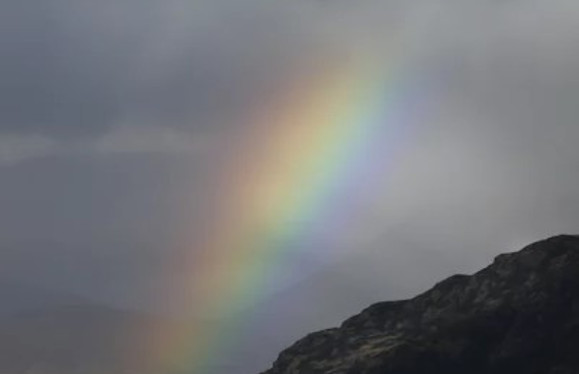
We Quakers find hope in the communal response to the Covid-19 crisis across our nation. The collective action of New Zealanders has demonstrated how much we can achieve together in a short time. We see the current pandemic as a warning which creates an unprecedented opportunity for systemic change and as a call to remodel our nation guided by the principles of sustainability, non-violence, simplicity and equity. This is a transformation that will require redistributive and regenerative economic, government and social policies that ensure all members of society benefit in an equitable manner.
Our vision is of a society that is inclusive and respectful of all people. We affirm the special constitutional position of M?ori and a Treaty-based, bi-lateral system of government. We seek government which leads with integrity, shares information based on evidence, and engages with communities prior to decision-making. We oppose violence at every level and look to practices that bring peaceful dialogue and non-violent management of conflict.
Quakers have a strong sense of the sanctity of creation. We are committed to the development of systems and new societal norms to rebalance climate disruption, preserve biodiversity and water quality and enable New Zealanders to live simpler lives within sustainable natural boundaries. We support the use of national resources to provide housing, low-carbon transport, and regenerative food production to benefit future generations.
We see that society has been putting profit and consumption above other considerations despite clear evidence that earth’s natural limits have been exceeded. Consumer lifestyles have been destroying the natural ecosystems required by future generations. Decades of neoliberal economic and social policies have allowed a few people to set the agenda and benefit disproportionately. This has condemned many to low wages, poverty and insecurity whilst also degrading the environment.
Quakers consider that the current pandemic offers the people of Aotearoa New Zealand a chance to reassess the situation and to create a new sense of community and purpose. The Light of the Spirit has inspired Quakers through the generations into social and environmental action. We see this experience with Covid-19 as the impetus to find a way forward based firmly on the Quaker values of peace, simplicity, and equity.
Quakers call on every person in Aotearoa New Zealand to bring about whatever changes they can to enable us to live in harmony with one another and with the planet.
Lesley Young
Yearly Meeting Clerk
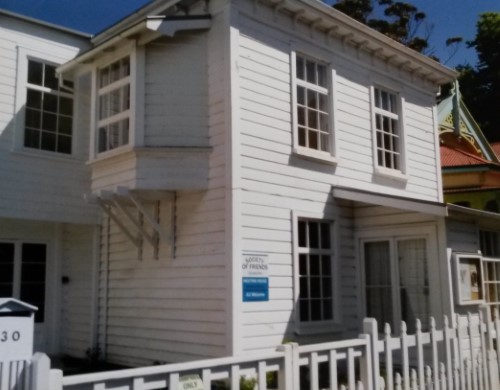
It was 10 weeks since Friends last gathered together in person to share an hour of silent contemplation and worship when on Sunday 31st May we returned to the Meeting House. Because of Covid-19 restrictions Meetings for Worship have been held online by Zoom in the meantime, allowing Friends from Motueka, Blenheim, and North Canterbury to join us, as well as Friends who aren't always able to get to Meetings. Our evening discussion groups were also held online, and may continue to be through the cold winter months. So successful have these get togethers been that we intend to integrate in-person and online meetings so that Friends can continue to attend the same Meetings online.
Not only does this accommodate the needs of Friends, it has the virtue of limiting the use of fossil fuels by those who travel longer distances to be able to participate in Quaker activities.
During Level 2 we are required at our in-person gatherings to observe physical distancing of 1 metre, to maintain hygiene (hand sanitiser is on hand), eschew hand shakes, keep a record of names and contact details of attenders, and forgo refreshments. These are small things compared to the shared achievement of curtailing the coronavirus and to avoid a second wave. Nevertheless, we anticipate Level 1 eagerly if it allows a return to pot luck meals!
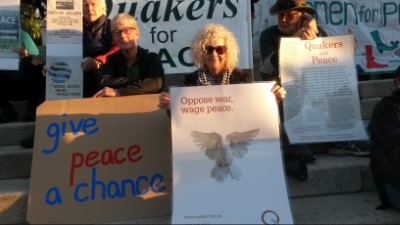
Anzac Day is an annual reminder of the horror of war, of the lamentable loss of life of armed forces, non-combatants and animals, and of continuing burgeoning militarism. This year vigils were held online because of the Covid-19 lockdown, hosted by Peace Movement Aotearoa in association with Quakers. There was a call for poetry, pictures and comments on Peace Movement Aotearoa's Facebook page, As always the call is for peace, to remember all the casualties of war, to remember all who resisted war and to honour the war dead by ending war.
One of the activities suggested was penning an acrostic poem using the letters of Lest We Forget as the first letter of each line. Here is a contribution by Dunedin Quaker Stephanie du Fresne:
Little ones around the world in poverty are dying
Everywhere around the world helpless women are crying
Still we are asked to prepare our country for war
To keep "combat readiness" to pay more and more and more
When all the dead were buried at Gallipoli
Eventually the Ataturk gave all his blessings and pity
Falsehoods about how easy the invasion would be before it were told
Only to ensure our fighting men going there would be bold
Reality of the ugly slaughter returning veterans said
Got transformed by parliamentary insistence to "honour our glorious dead"
Empire was glorified, we were offered national pride
Those in Aotearoa bereaved of their menfolk just went ahead and cried.
.Full stop Can we please stop the warmongering now and focus on peacebuilding?
You can find more poems and images here:
https://www.facebook.com/notes/peace-movement-aotearoa/anzac-day-virtual-peace-activities/2865702216810462/?hc_location=ufi
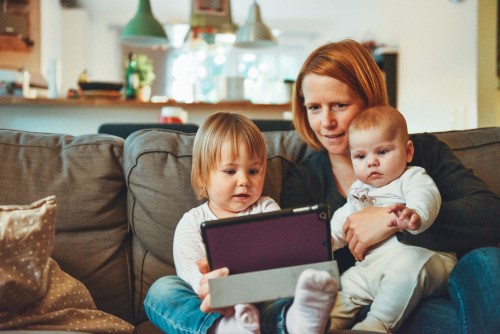
Being part of a Quaker Meeting is to be part of a loving community. Not being able to be together in the same space is like missing a family event. It doesn't mean we can't be together face to face however. From Sunday 29th March we will hold Meeting for Worship by Zoom at 10am and you are invited.
We hope that Friends who have been unable to join us in the past because of other Sunday commitments or because they live remotely might be able to join us in silent waiting worship and contemplation. As we are all making our generous and loving commitments to the community around us by staying home, doing our part to stop the virus, we also need times to be together. Our gatherings have to be virtual ones for now. Please join us every Sunday morning before 10am here: Nelson Friends Zoom link
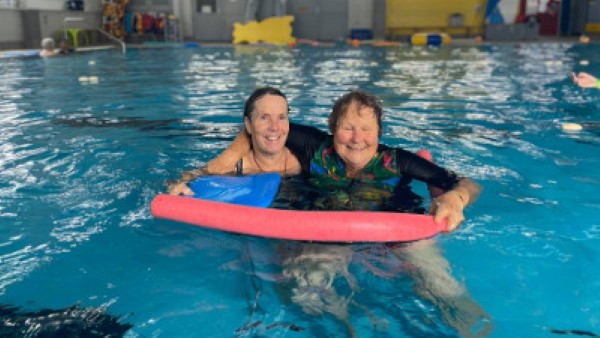
Quakers in Nelson decided last March after the Mosque murders in Christchurch that we wished to support Nelson's Muslim community is some practical way. Earlier this year the opportunity arose thanks to Wendy Claire and the Richmond Aquatic Centre to sponsor women-only swim sessions. These are very much valued by Muslim women and also by non-Muslim women who enjoy being free of male gaze, being able to swim in their shorts, baggy t-shirts or burkinis.
The first swim was held on February 15th. Women not only enjoyed being able to splash about without feeling judged for their size or shape or swimming prowess but also valued the opportunity for Muslim and non-Muslim women to meet in a very informal way and get to know one another. There were female lifeguards and swim coaches to help those wanting to learn to swim or to try aqua-aerobics.
The next session is on Saturday 14th March between 2pm - 4pm. It is open to all women and girls over the age of 12. The cost is only $2 per person. To learn more phone 027 390 6923 or email wendy.claire@gmail.com.

Values-based children's meetings, one for children up to 7 years and one for children 8 - 12 are being offered monthly to whanau and tamariki in the community. They will focus on Peace, Equality, Simplicity, Integrity and Sustainability. Quakers in Nelson have enjoyed quarterly parents/grandparents and children's meetings for the past 2 years but at the request of our families we are stepping up to provide 10 monthly Sunday meetings for children and monthly home-based meetings for their parents. Currently those parents meetings are based in Wakefield and Redwoods Valley, but we are ready to provide Richmond or Nelson parents meetings if the opportunity arises. There is no cost though koha is welcome. If you would like to know more contact us on info@quakers-in-nelson.org nz.
Simple Gifts

Simple Gifts
Simple Gifts is a compilation of 50 short reflections on the many joys of Jan's quiet life - the beauty of the environment, the pleasure of walking and swimming, her family and friends - and on some underlying values and concerns. Several have been printed as One Quaker's View on this website. Jan is a retired clinical psychologist and her empathy and therapeutic skill shine through many of the stories. Other stories are contemplative and reflect Jan's longstanding practice of listening worship at Quaker Meetings. A humanist, Jan draws on many sources of inspiration, including the Buddha, Quaker thinkers, and the Bible. They all reflect her meditations on the daily events of life, fishing, running, or talking to strangers.
Not quite enough for a weekly meditation this wee book will reward re-reading. It is available for purchase from Jan for $20. You can contact her through info@quakers-in-nelson.org.nz
a moving performance by Te Oro Haa
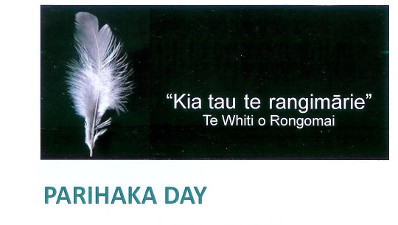
Parihaka Day on November 5th has been marked in Nelson for the past decade thanks to the consistent commitment of the Parihaka Network Whakatu. This year's events organised by the Network - performances of the Parihaka Play on November 2nd, the Dawn Blessing on November 5th and a following breakfast at the Quaker Meeting House, were crowned by the deeply moving performance of a very personal account of her whanau connections to Parihaka and the events of 1881, and the significance of reconciliation, by Donna McLeod and Te Oro Haa at Old St Johns. The performance was a combination of spoken word, song and traditional Maori musical instruments.
This year Parihaka Day was preceded a week earlier by the passage of the Reconciliation Bill at its third reading. This legislation records the history of the military invasion and non-violent resistance of the people of Parihaka on November 5th 1881 and the subsequent violations and destruction of the village. It records the Legacy Statement of Parihaka and the Principles by which Parihaka aim to live, especially its commitment to peace and non-violence . It includes the Apology given by the Crown to the people of Parihaka past and present.
Perhaps of this act of remembrance and contrition is contributing to a growing interest and understanding of the significance of Parihaka. The decision for NZ history to be taught in all schools and the call for recognition of the truth of the Land Wars is another sign of greater readiness to acknowledge the failure of the government of the day to recognise or respect the right of iwi to self-determination and partnership that had been promised almost 4 decades earlier in Te Tiriti o Waitangi.
Quakers support the work of the Parihaka Network, and we are gladdened by the increasing interest in the story and lessons of Parihaka Day this year. We will continue to promote the Parihaka values of peace, non-violence, autonomy, sanctuary, equality and respect, innovation and hard work, self-sufficiency, resilience, unity and hope which are so in accord with our own Testimonies.
Quaker Meeting House 30 Nile St. Nelson

The aim of interfaith dialogue and activities is to promote good relations, understanding and respect among the followers of different faiths and to cultivate tolerance, compassion, unity, and peace in our community, our nation, and our world.
Below is the programme for 2019:
- Sun 13th. Bahai Faith Queens Gardens Hardy St entrance 4pm
- Mon 14th. to be advised
- Tues 15th. Nelson Islamic Centre 226 Trafalgar St 7pm bring a plate (sweet)
- Wed 16th Quaker Meeting House, 30 Nile Street, Nelson 7pm
- Thurs 17th Chandrakirti Meditation Centre, Sunrise Valley 5.30pm bring a plate (vegetarian)
-
Fri 18th Oct: Methodist Church, 94 Neale Avenue, Stoke 5:30pm
- Sat 19th Nelson Cathedral Anglican and Maori Mission 2.00pm-3.30pm bring a plate
- Sun 20th Joint Gathering All Faiths Broadgreen Gardens Nayland Rd 3 pm bring a plate. If Wet Latter Day Saints Church Nayland Rd.
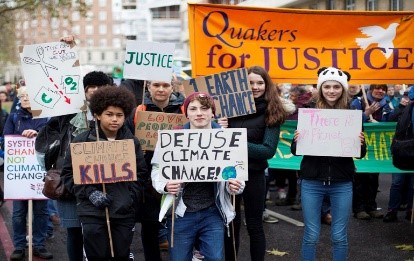
Tens of thousands of students took part in strikes in March and May, and organisers are hoping the next action on September 27 will be even bigger. The strike will mark the end of a global week of climate-focused events and challenges running from September 20. Students want adults to show their support by walking out of work to join them.
School Strike 4 Climate NZ are holding this third strike to demand our Government and elected members take urgent and meaningful action for the climate and our collective future. New Zealand students will be uniting with students from across the world once again but this time, in a general strike with the general population. This general strike is on Friday, 27th September.
“We will not back down: we will continue to make our voices heard until all of our demands are met. Our representatives need to show us meaningful and immediate action that safeguards our futures on this planet. Nothing else will matter if we cannot look after the Earth for current and future generations. This is our home".?
To recognise the significant threat climate change poses to all our futures, livelihoods and very existence School Strike 4 Climate NZ are calling on all New Zealanders to join in and stand in solidarity on 27th September for urgent action on the climate crisis. Student strikers are encouraging their parents and grandparents along to the strike and the general population are invited to get involved. Learn more at http://www.schoolstrike4climatenz.com/
You can add your name to a petition in support of these courageous students striking for climate action: People Power for Our Planet. Celebrate young people using the power of the collective to help ensure we have a healthy planet. Add your name to those who stand alongside students striking for climate action. Sign here: http://www.together.org.nz/people-power-planet?recruiter_id=45489
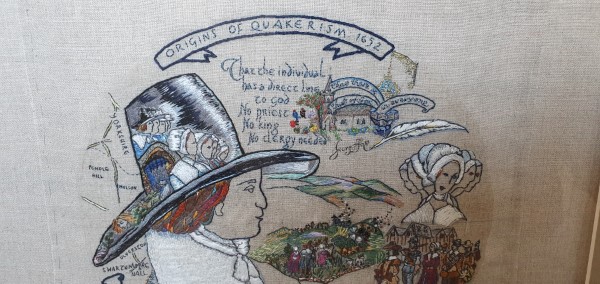
2 years ago Quakers in Nelson embarked on the creation of three embroidery panels depicting the history of Quakers in Nelson, starting with their origins in the north of England in 1652. The first panel shows 2 founding Quakers Margaret Fell and George Fox in two separate roundels. Now completed, it is on display in the Meeting House. The photo above shows just one part of the completed panel. In the top roundel Swarthmore Hall, home to Judge Fell and Margaret Fell in the Yorkshire Dales, is depicted. Margaret Fell was convinced of George Fox's message that all can have a direct relationship with God without need for a priest or pastor - a radical proposition for the time. She made her home available for the first Quakers as a retreat where they could recover from their missions throughout the United Kingdom, and recuperate from periods of imprisonment and persecution. Quakers suffered because of their perceived threat to the established Church and State. Swarthmore Hall is still a retreat centre for Quakers. The 1660 petition of Quakers to King Charles II expressing the Quaker commitment to peace is also shown.
The second roundel shows George Fox's vision for the Society of Friends, and Pendle Hill where he preached to thousands. The Society was formed from those gatherings of seekers.There is reference to the importance of women's preaching, the rejection of outward sacrements such as baptism; and the persecutions that followed.
Almost everyone in the Meeting has contributed to the panel, either by doing research, creating the cartoon, or stitching the embroidery. The second panel showing the arrival in Nelson of the first Quakers and their engagement with local iwi is being embroidered now. It has been carefully researched and designed to truthfully reflect the history. 2 Quaker surveyors were caught up and one killed in the Wairau affray. The third panel dealing with Quaker contributions to peace is still in early stages of design.

Quakers Aotearoa have established a Climate Emergency Correspondent to represent Friends at ecumenical and other climate networks. At our annual national meeting Quakers resolved to address Government with our concerns at the impact of military activity on the climate.
Experts suggest that militarism is possibly the world's biggest producer of greenhouse gas emissions. One examination of the issues available online states: “Regardless of whether it is during war or peacetime, the world’s armed forces consume enormous amounts of fossil fuels, produce immense quantities of toxic waste and have exceedingly high demands for all kinds of resources to support their infrastructures, all along being exempted from environmental restrictions and emission measurements.
According to the treadmill of destruction theory, war is waged nowadays mainly for securing natural resources which are themselves being massively consumed in the process, thereby establishing a self-perpetuating cycle of destruction. Moreover, military spending diverts massive funding from climate mitigation and adaption initiatives".
“A possible solution for this situation is proposed in the shape of a civil society approach, taking full advantage of the power of nonviolence, bottom-up strategy and the tools of the arts, humour and creativity".
University of Luxembourg European Master’s Degree in Human Rights and Democratisation, Academic Year 2014/2015, The Impacts of Militarism on Climate Change: A sorely neglected relationship. The effects on Human Rights and how a Civil Society Approach can bring about System Change. Author: Mag. Florian Polsterer.
https://repository.gchumanrights.org/bitstream/handle/20.500.11825/325/Polsterer.pdf
Join the International Day of Action against Puma this Saturday 15th June 2019
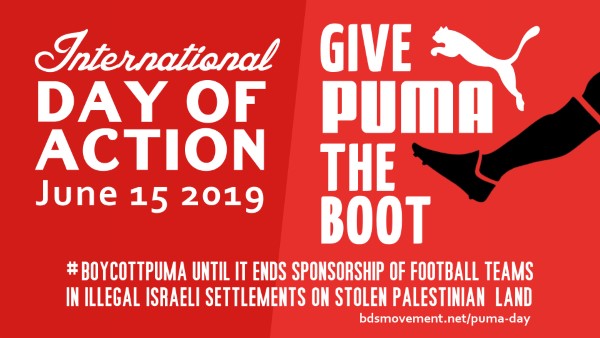
Puma is the main sponsor of the Israel Football Association (IFA), which, as documented by Human Rights Watch, includes football clubs based in illegal Israeli settlements on stolen Palestinian land. Israeli settlements are illegal land grabs that form an integral part of Israel’s occupation infrastructure pushing indigenous Palestinian families off their land, robbing Palestinians of natural resources, and denying Palestinians their right of movement.
All Israeli settlements are considered war crimes under international law.
More than 200 Palestinian teams have called on Puma to end its support for Israel’s military occupation by terminating its sponsorship deal with the IFA. While Puma did reply to the Palestinian teams, it failed even remotely to address the issues raised.
This Saturday, on the 15th June, Quakers in Nelson will be joining Palestinian supporters in 20 countries across the world in the #BoycottPuma day of action. Organised in Nelson by Te Tau Ihu Palestine Solidarity, supporters will be gathering outside the Rebel Sports store in Nelson at 11am. Join us there.
Rallies are taking place internationally outside Puma stores, offices, and stores which stock Puma. .
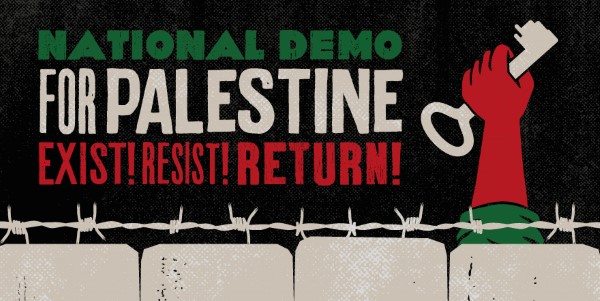
poster for London demonstration May 11 2019
The demonstration organised by Te Tau Ihu Palestine Solidarity is on May 11th, gathering at 1903 Square, Trafalgar Street, Nelson at 11.am. More details are on the Events page of this website.
Its purpose is to draw attention to the Great March of Return in Gaza Palestine, at the Gaza-Israeli boundary. Originally planned as a six-week campaign, protests have continued weekly since then.
The protests are to demand that Palestinian refugees and their descendants be allowed to return to the land they were displaced from, in what is now the State of Israel. They are also protesting the blockade of the Gaza Strip. The results for Palestinians have been deadly.
On 8 March this year a United Nations independent commission of inquiry released a report on the demonstrations, stating that they have grounds to believe Israel committed international war crimes against demonstrators during “large-scale civilian protests”. Here are some of the most important points from the report:
- The commission found that of 189 demonstrators killed between 30 March and 31 December 2018, 183 were killed with live ammunition, including 35 children, 3 health workers and 2 members of the Press. Only 29 of those killed were members of Palestinian armed groups.
- Only 4 Israeli snipers were lightly injured, none were killed by demonstrators.
- 23,313 Palestinian demonstrators were injured during the 2018 demonstrations, 6106 with live ammunition.
- On the killing of child demonstrators, the commission found “reasonable grounds to believe that Israeli snipers shot them intentionally, knowing that they were children”.
- The commission found that both male and female protestors were shot in the groin. The female victims told the commission they are now “unlikely to be able to have children”.
The often-repeated Israeli claims of the protests being inspired and organized by “Hamas terrorists”, were also addressed in the report. It stated that the demonstrations were inspired by the internet posts of 34-year-old Palestinian poet and journalist, Ahmed Abu Artema, with the demonstrations being organized by “A higher national committee and 12 subcommittees.” The report went on to say, that “while the members of the committee held diverse political views, they stated that their unifying element was the principle that the march was to be “fully peaceful from beginning to end and demonstrators would be unarmed”. The commission also noted that Israel refused to assist with the UN investigation and did not “cooperate or provide information.”
Some examples of the deaths and injuries:
- Injury of 17 Mohammed Ajouri (17 years old). “Israeli forces shot Mohammad, a student-athlete, in the back of his right leg as he gave onions to demonstrators to relieve tear-gas symptoms, approximately 300 m from the fence. His leg had to be amputated.”
- The murder of Abdel Fatah Nabi (18 years old). “Israeli forces killed Abed, from Beit Lahia, when they shot him in the back of the head as he ran, carrying a tyre, away from and about 400 m from the separation fence.”
- The murder of Bader Sabagh (19 years old). “Bader, from Jabaliya, was killed by Israeli forces when they shot him in the head as he stood smoking a cigarette 300 m from the separation fence.”
- Injury of Alaa Dali (21 years old). “Alaa, a member of the Palestinian cycling team, was shot by Israeli forces in the leg as he stood holding his bicycle, wearing his cycling kit, watching the demonstrations, approximately 300 m from the separation fence. His right leg had to be amputated, ending his cycling career.”
- The murder of Yasser Abu Naja (11 years old) “On 29 June, Israeli forces killed Yasser from Khan Younis with a shot to the head as he was hiding with two friends behind a bin, approximately 200 m from the separation fence. The children had been chanting national slogans at Israeli forces.”
- The murder of Razan Al-Najar (20 years old) “On 1 June, an Israeli sniper bullet hit Razan, of the Palestinian Medical Relief Society and who at the time was wearing a white paramedic vest and standing with other volunteer paramedics approximately 110 m from the separation fence, in the chest at the Khuzaa site, east of Khan Younis. She died in hospital.”
- The murder of Yasser Murtaja (30 years old) “On 6 April, Yasser, a journalist from Gaza City, was shot in the lower abdomen by Israeli forces at the Khan Younis site while he was filming the demonstrations for a documentary. He was wearing a blue helmet and a dark blue bulletproof vest clearly marked “Press”. He died the following day.”
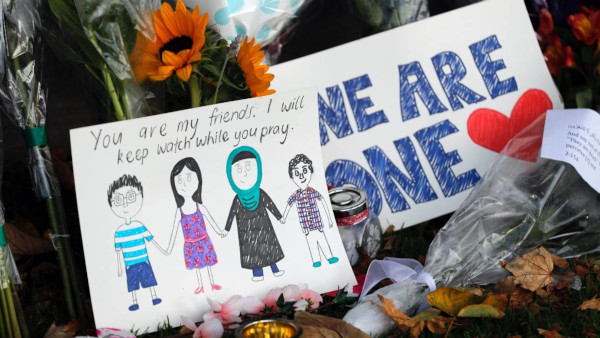
On the 16 March 2019, the day following the massacre of Muslims at prayer in Christchurch, the head of the NZ Quaker community wrote on our behalf to the Federation of Islamic Associations:
Dear Dr Farouk
I write on behalf of Quakers in Aotearoa New Zealand to express our heartfelt sympathy to all members of the Islamic faith at this time of tragic death and injury inflicted on worshippers in the two mosques in Christchurch.
Violence in all its forms is abhorrent to us and we are dismayed that such a level of violence has been perpetrated on Muslim members of our community. We treasure the many faiths that make up the mosaic of our community and when people of one faith suffer, we all suffer. We stand in solidarity with you in denouncing such acts of violence and commit to doing all we can to foster compassion, kindness and peace.
Our prayerful thoughts of support and friendship are with you at this very difficult time.
Yours in Peace and Friendship
Lesley Young
Yearly Meeting Clerk
Click on the links below to read older news items:
Cherishing children & families
